














CAFOD/CBCEW/ICN
Flame 2025 united over 10,400 young people in faith, hope, and inspiration at Wembley Arena
Flame 2025 saw more than 10,400 young people from every part of England and Wales, as well as a group from Gibraltar and the Ukrainian national Chaplaincy, join chaplains, teachers, priests, bishops, and youth leaders, in selling out the OVO Arena Wembley in a huge explosion of faith and hope. This was the largest-ever Flame gathering.
Inspirational speakers included adventurer and television presenter Bear Grylls, who spoke about his book The Greatest Story Ever Told based on the Gospel - every attendee received a copy.
In conversation with Catholic speaker David Wells, Mr Grylls shed light on his Christian faith: "Faith is in your heart, faith is in relationships, faith is a constant connection to the Almighty. I have many struggles, many doubts, I really don't have it all together, but I know that I am loved and held, and the light shines.
"Faith is part of the adventure, faith is the adventure. It's a journey… It's a backbone, a streak of steel, the presence of Jesus besides us in the highs and the lows. It's fire and life and water, all in one. It's a journey."
To a packed out and loud crowd, he added: "I hope you have an amazing rest of Flame. You guys are unstoppable!"


Flame's theme of "Unstoppable: Fan the flame of hope" echoed what Pope Francis calls us to be in this year of Jubilee: "Pilgrims of Hope."
Rt Rev David Oakley, Bishop of Northampton, who is Chair of the Department for Discipleship and Evangelisation for the Catholic Bishops Conference of England and Wales, read a message from Cardinal Parolin on behalf of Pope Francis, who encouraged the young people saying: "Fan a flame of hope that is truly 'unstoppable' for Christ itself is its living source."
Bryan Enriquez, a founding team member of the Hallow prayer app, spoke as well as Isaac Harvey MBE, an inspiring disability advocate. Isaac Harvey said: "It's about having faith, having hope, and at the end of the day having fun. Going with the flow, having fun, and taking opportunities as they come."
Fr Dominic Howarth, a priest of Brentwood Diocese who co-chairs the planning team for Flame 2025, read a message from the
encouraged the young people with these words: “Let your faith shine brightly in the world, and know that you are not alone on this journey."
The message from St Vincent de Paul Society was: "You are loved, you are lovable, and you are loved by God."
CAFOD partner, Brian Maeba, a young farmer from Kenya, spoke about the global debt crisis, where some of the world's poorest countries make huge repayments on high-interest loans to wealthy banks, institutions and governments, leaving them unable to fund essential services.
Brian encouraged the audience to support CAFOD's debt cancellation campaign by shouting out "cancel debt and choose hope".
Rapper Guvna B, and singer songwriter Adenine Adewale, the World Youth Dance
Lily Jo, were much appreciated for their lively and participatory worship style. There were moving testimonies from disability advocate Isaac Harvey and De La Salle Brother Chris Patino from San Francisco. Students from St Thomas More's School, Wood Green gave a powerful theatrical performance.
Among the VIP guests in the audience was Declan Donnelly (of Ant & Dec fame) , brother of Fr Dermott Donnelly who died in 2022, one of the founders of Flame, who was loved for his ministry with young people. Dec told ICN: "I've just come here today to honour my brother."
Flame 2025 concluded with a moving moment of Adoration of the Blessed Sacrament, led by Cardinal Vincent Nichols, capping a day of spiritual renewal, encouraging young people to return to their parishes and schools as ambassadors of hope.
Flame is supported by the Catenians and organised by CYMFED.


CONTACT US:
The Catholic Post is published by its owners CathCom Limited and is wholly independent of and separate from any previous newspaper.
The Catholic Post is published on the last Sunday of the month previous to publication date.
EDITOR:
Nick Layton
email: editor@catholicpost.co.uk
ADVERTISING:
Charlotte / CathCom Ltd. 01440 730399
charlotter@cathcom.org
DESIGN & LAYOUT:
David Lodge, davidl@cathcom.org
PUBLISHED BY:
CathCom Ltd. N2 Blois Meadow Business Centre, Blois Road, Steeple Bumpstead, Haverhill, Suffolk CB9 7BN 01440 730399
ARTICLES TO:
The Catholic Post email: editor@catholicpost.co.uk or davidl@cathcom.org
Please send articles for publication by email, supplying any photos separate to the text We welcome contributions
Here are answers to some basic questions about writing for The Catholic Post How long should articles be?
Usually it seems to work out best if contributors simply say what they have to say and let us worry about finding a spot for it in the paper. What is the submission procedure?
Please send as a Word file attached to an e-mail. To submit articles for publication, send to editor@catholicpost.co.uk
Charts, graphs, and photos should be submitted as separate PDFs. Electronic photos should not be embedded or pasted into a Word document as this reduces their quality.
Photographs and Illustrations
Photographs and Illustrations should be supplied electronically as high resolution JPEG (*.JPG) files).
Photographs and illustrations should be sent in colour with a resolution of 300 dpi and a minimum size of 100 mm x 100 mm when printed (approx. 1200 pixels wide onscreen).
Computer print-outs are not acceptable. Screen captures are not ideal as they are usually not very high
Parental permission should be sought before submitting photographs of minors.
Source information -
DW = Diocesan Website.
ICN = Independent Catholic News
Views expressed in The Catholic Post are not necessarily those of the editor Last date for copy is the LAST DAY of the month prior to publication.
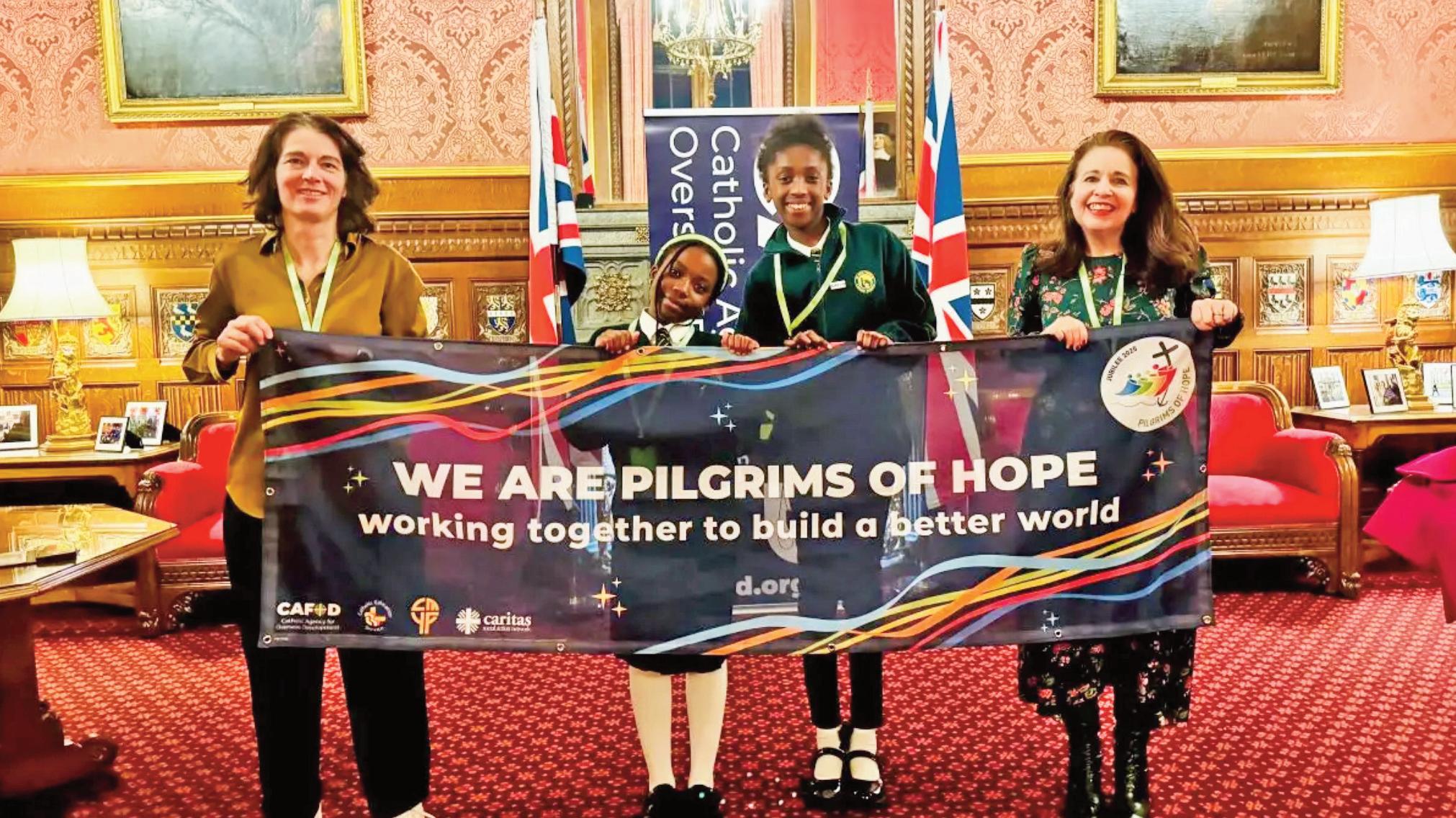
cafod.org.uk
Schoolchildren and campaigners from across the UK visited Parliament this week to urge MPs to address the global debt crisis which is engulfing many poor countries around the world.
They’re calling for a new Debt Justice Law, to create a fairer global system for low-income countries facing insurmountable levels of debt.
The aim is to target irresponsible, 'loan-shark' behaviour - seen in some private creditors over the years - who are able to avoid accountability but rake in profits from unfair lending to poorer countries, burdening them with debt that can never be repaid.
The result is what’s being called a “global debt crisis”, where some of the world’s poorest countries are forced to spend more on payments to big banks and hedge funds than on health, education or life-saving climate measures. 54 countries – from Sri Lanka to Kenya – are facing debt distress today.
The parliamentary reception was arranged by Catholic overseas aid charity CAFOD (Catholic Agency for Overseas Development). Campaigners were able to meet MPs and raise concerns about loans being made by predatory lenders, often at extortionate interest rates.
Parliamentarians could pass a law to force lenders to cooperate in debt relief negotiations and stop them from demanding payments from countries in crisis – providing valuable protection and relief to 54 countries, at no cost to the British taxpayer.
“A future where the burdens of debt no longer weigh heavily on the shoulders of those who can least afford it”
Speakers at the event included Anneliese Dodds, Former Minister of State for Development and Brian Maeba, from CAFOD partner Jesuit Hakimani Centre, who spoke movingly about the debt crisis in his own country: “Kenya is deeply stuck in debt. Because of the debt crisis, money is going to paying off debt instead of going to health, education and agriculture. People in Kenya are going to bed hungry and young people can’t go to school. That’s why we are here today. Together, we can build a future where the burdens of debt no longer weigh heavily on the shoulders of those who can least afford it.”
Maria Finnerty, Lead Economist at CAFOD said: “It is great that so many people could come to the event to campaign about tackling the global debt crisis which is engulfing poor countries. Taking action on unfair debts would not cost the UK taxpayer anything but would make an enormous difference in the lives of the most vulnerable people around the world.”
Nuala Kennedy (pictured), a teacher from St John Vianney school in Tottenham who was at the event with children from her school, commented on what she’d learned about the
crisis: “Global debt is like a spiral. The intention should be that people get out of debt. But debt collectors keep adding interest, adding interest, adding interest, so nobody is going to get out of this. It’s eye opening.”
LisaMcDermot, an RE Teacher from St Augustine’s in Ealing also shared her concern: “It’s the injustice of it. It’s just not fair. How can the developing world get out of the Catch-22 cycle of debt when they’re spending so much more on paying interest repayments rather than investing in infrastructures? Like education and healthcare.”
Lisa added: “It’s rooted in our Catholic social teaching – the dignity of the person. How can we say we need to give X amount to a huge multi-national bank when that should be going to feed and educate people?”
Pope Francis has called for Catholics to be "Pilgrims of Hope" this Jubilee year, urging them to push for rich governments to cancel debts of countries that “will never be able to repay them”. Jubilee years traditionally happen every 25 years in modern day, and have been marked by the cancellation of debts since Biblical times.
CAFOD is encouraging anyone concerned about the global debt crisis to write to their MP, asking them to call on the Chancellor, Rachel Reeves, to pass a Debt Justice Law.
More information is about debt injustice scan the QR Code below:

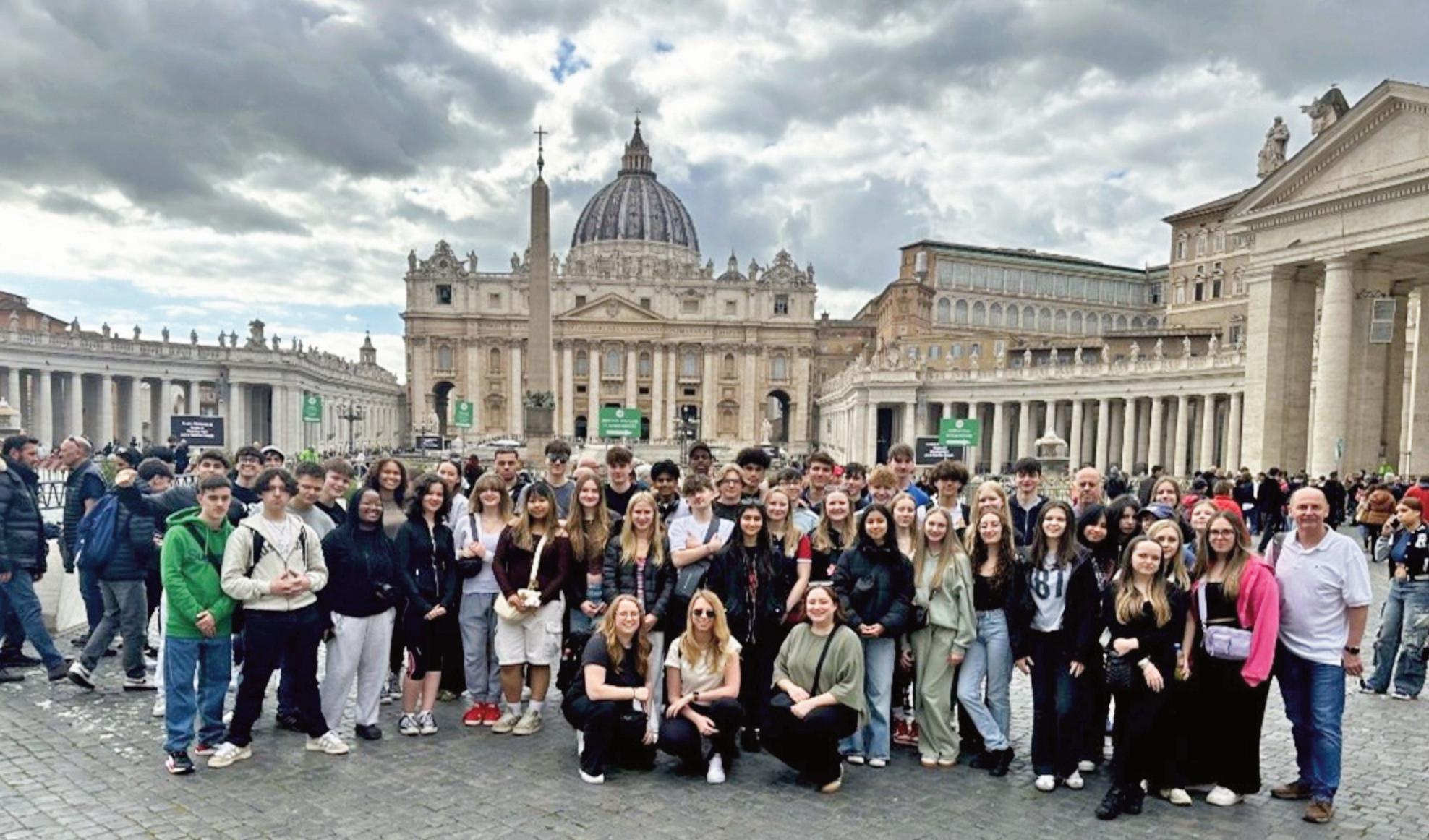
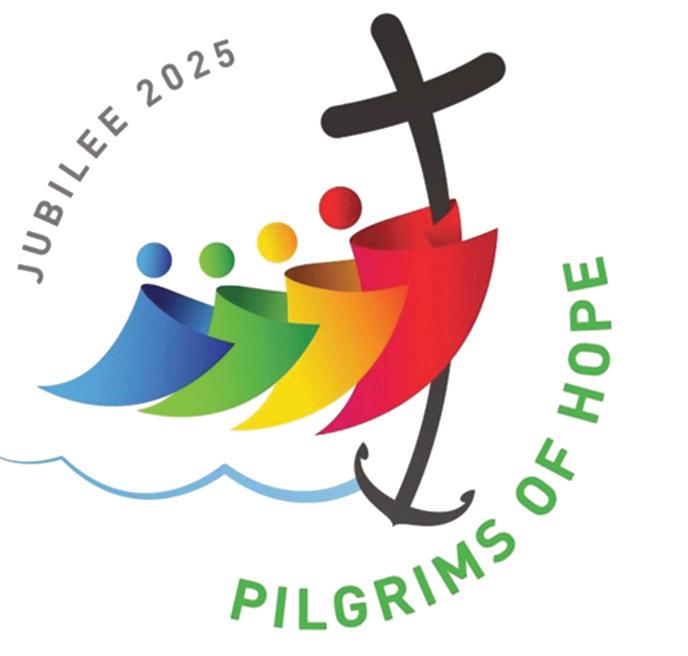
hallam-diocese.com
The students explored Rome’s rich history, Vatican treasures, and faith, creating lasting memories together
This February, 49 All Saints students and staff had an unforgettable trip to Rome. On the first day, although tired from a long journey, they were able to get their first taste of the staggering history of Rome, visiting sites such as the Pantheon, Trevi fountain, and Castel Sant’Angelo. They also visited the tomb of St. Catherine of Siena where, under the main altar, her remains are preserved. In the front, two small angels, hold an inscription which presents to the pilgrim or the visitor the saint buried here: “Sancta Caterina de Senis Ordinis Santi Dominici of Poenitentia” (Saint Catherine of Siena of the Order of Penance of Saint Dominic).
On the Friday, students spent a great deal of time in the Vatican, spending the morning climbing the 551 steps to the top of the Dome. Most special, and something only possible every 25 years, was students and staff entering St. Peter’s Basilica through the Holy Door, reminding students of this Jubilee year. Afterwards, students had a guided tour around the Vatican museums; Year 13 Philosophy students loved seeing ‘The School of Athens’ in the flesh. The tour ended in the Sistine Chapel, where we spent time reflecting with hundreds of others; many students commented that this was their highlight of the trip.
Despite the beautiful weather of the rest of the visit, we spent Saturday at the Colosseum in
the rain which, thankfully, did not alter spirits. Students learned of how Christians were martyred at the Colosseum and were fascinated by the deep history of one of the seven wonders of the world. Much to their delight, they were then able to take the short walk up the road to the Basilica of San Clemente and view the mosaic they have studied in such detail. Some students marvelled that they could not believe they were seeing it in real life and spent time talking through with each other everything that they could remember about its intricate details.
The Sunday saw students joining the celebration of Mass at the Venerable English College, where they were welcomed warmly by Fr Stephen Wang, rector of the College. We prayed for Pope Francis’ health and reflected on how every person is capable of being a saint in their day-to-day lives. At the end of the Mass, the reliquary of the English Martyrs’ under the altar was opened specially for All Saints to place prayers from staff and students back home. There was time for individual prayer in front of the altar where students took the opportunity for quiet reflection.
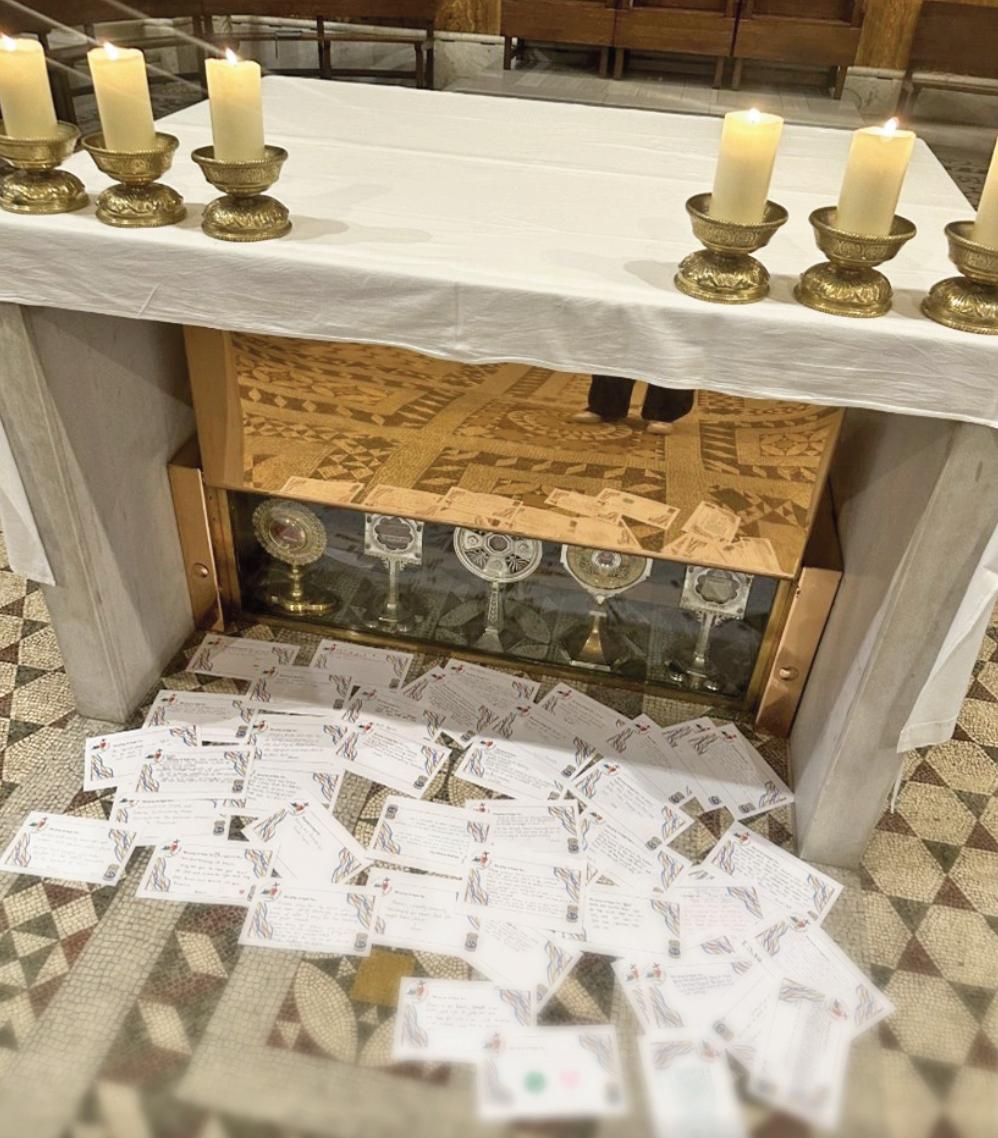
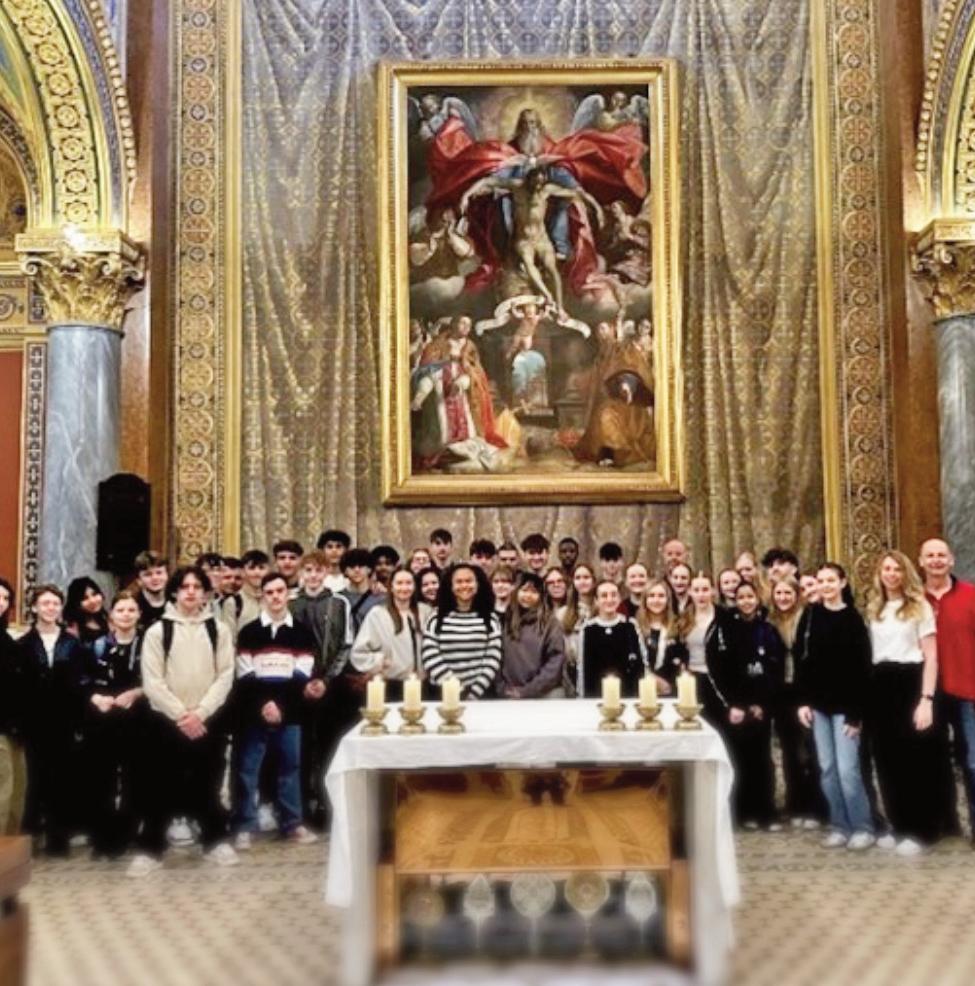
From the Students:
“For me, Rome has completely opened my eyes to a new understanding of culture and faith. I thoroughly enjoyed it and would love for many other students to have the opportunity and privilege of visiting Rome!’’
“Rome was an unforgettable experience for me; an amazing trip that helped me to make lifelong friends and allowed me to see monuments that I have wanted to see since I was little. It was so great!’’
“Rome was an amazing trip to go on before leaving school. It’s helped me form amazing connections with people I adore and become closer to those I already knew. It’s an amazing experience and enjoyable. It’s also an amazing way to visit somewhere new!’’
“Rome was such an incredible, once in a lifetime experience that I got to share with great friends, old and new. I’m so grateful for this opportunity and to have shared it with such great people.’’
C Staniland
It is in small things that we become truly Christian. When we truthfully open ourselves to God’s bidding and call, we will be kept more than busy. God relies on people with open hearts to be His hands and feet on this earth. This is practiced, not by looking for grand things to do, but by listening to the whisper of His voice in our daily chores and lives, in caring for those around us and in being aware of the small things that make a difference. In listening and in ‘being there’ for others, even if you had other plans! And when the doorbell rings yet again, remember, as was once said; ‘True hospitality is when you make people feel at home when you really wish they would be!’ To be a Christian is to be available.
A prayer to Our Lady for Assistance:
My Heavenly Mother; I ask you to teach us to love one another as you love us, and as you wish us to love.
A love free from deception and fear.
A love that springs from deep within our open hearts to overflow and stay with those we meet throughout our days on this Earth:
A love that shines as the stars in the Heavenly skies.
Somewhere, dear Mother, in our being, may You be reflected –and your love shine out to save those in the depth of dark and despair.
Guard us with Your purity –the purity given freely in the love of a tiny child. And through your children’s love for one another –may your plans be accomplished. Stay with us.
For you gave us the gift of Love to pass on to othersYou gave us the gift of Peace to give to others –and you gave us the gift of Joy. www.crownofthorns.org.uk email:office@crownofthorns.org.uk
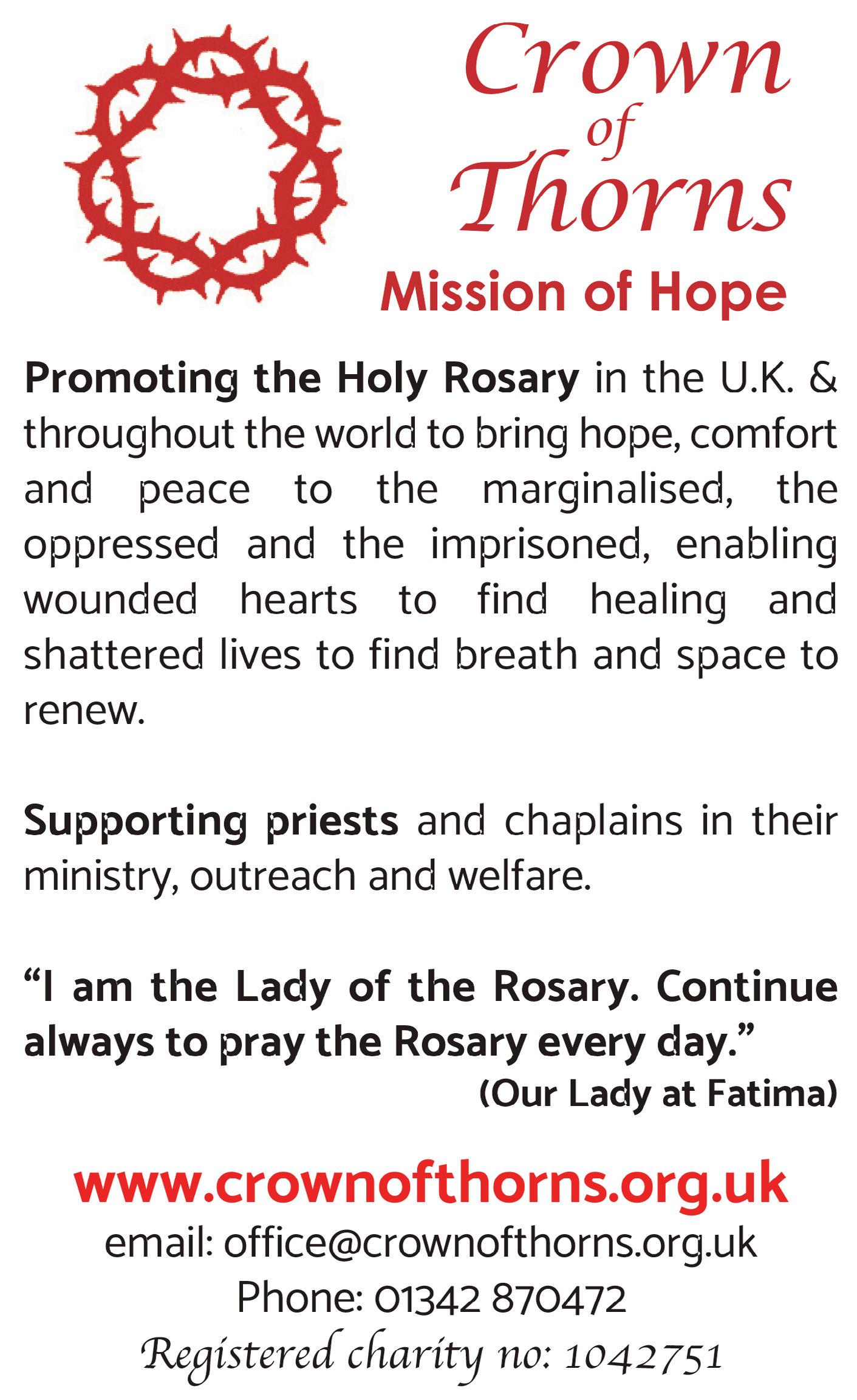
Youth urged to be “Ambassadors for Hope” during Light Night Festival Mass.
The Bishop of Nottingham has appealed to the youth of his diocese, to be “Ambassadors for Hope” while celebrating Mass, during Nottingham’s annual Light Night Festival.
During a powerful homily, reflecting on the Jubilee Year of Hope, Bishop Patrick McKinney said: “Pope Francis has especially highlighted the importance of young people - young adults - because as he says they are the joy and the hope of the Church and of the world. And that’s why I would like you to think of yourselves not just as pilgrims of hope but also as ambassadors of hope.”
An estimated 100 young people from across Nottingham Diocese, congregated at Saint Barnabas Cathedral on Friday February 28, which was spectacularly illuminated for a latenight Mass, in honour of the city’s annual event.
Reflecting further on the city’s celebration of light, Bishop Patrick told the young adults: “Hope is like a light shining in the dark. Look around you this evening at the light. Hope is like a light shining in the dark, reminding us that God is very much present. Hope is the reassurance that the darkness we all face at times will not overwhelm us if we hold on to and place our trust and confidence in the truth; this wonderful truth that since our baptism, God is always close to us.”

This is the third year in which the cathedral has participated in the city-wide tradition, when buildings and streets are illuminated after dark, to showcase Nottingham’s landmarks.
Bishop Patrick was inspired to participate, when he learned of a growing tradition in the French town of Lile, where young adults meet at 10pm every Tuesday, for Mass by candlelight at their university’s chapel.
Every young person present, elected to touch the garment, in recognition of their need for Christ’s healing in their lives.
Following Mass, there was time for Eucharistic Adoration in which young people were invited to meditate on the Scriptural passage, about
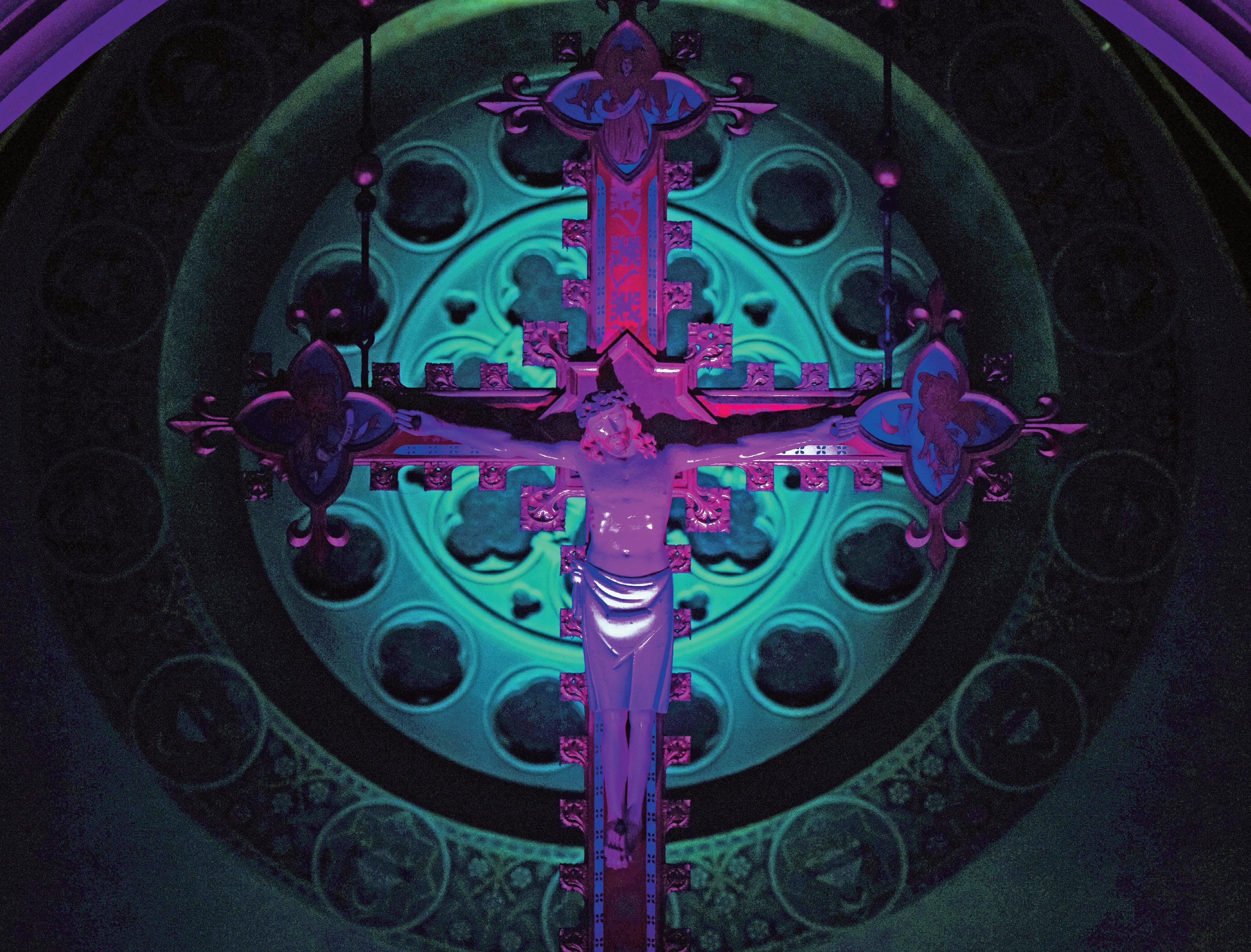
Reflecting on the evening, Charles Archer, Diocesan Young Adult Ministry Lead, commented on how inspiring it was to see every single young person present themselves for healing. “Everyone came forward and dedicated time to kneeling before the Lord,” he said. “It was really beautiful.”

A young adult, Clement, who attended and helped with the running of the event as an Altar Server, added: “It was amazing! I loved the Adoration at the end, and it was nice to see the cathedral lit up so beautifully.”
To find out about more events and opportunities for 18-35 year olds, please contact Charles Archer: charles.archer@dioceseofnottingham.uk
Photographs courtesy of Diocese of Nottingham dioceseofnottingham.uk
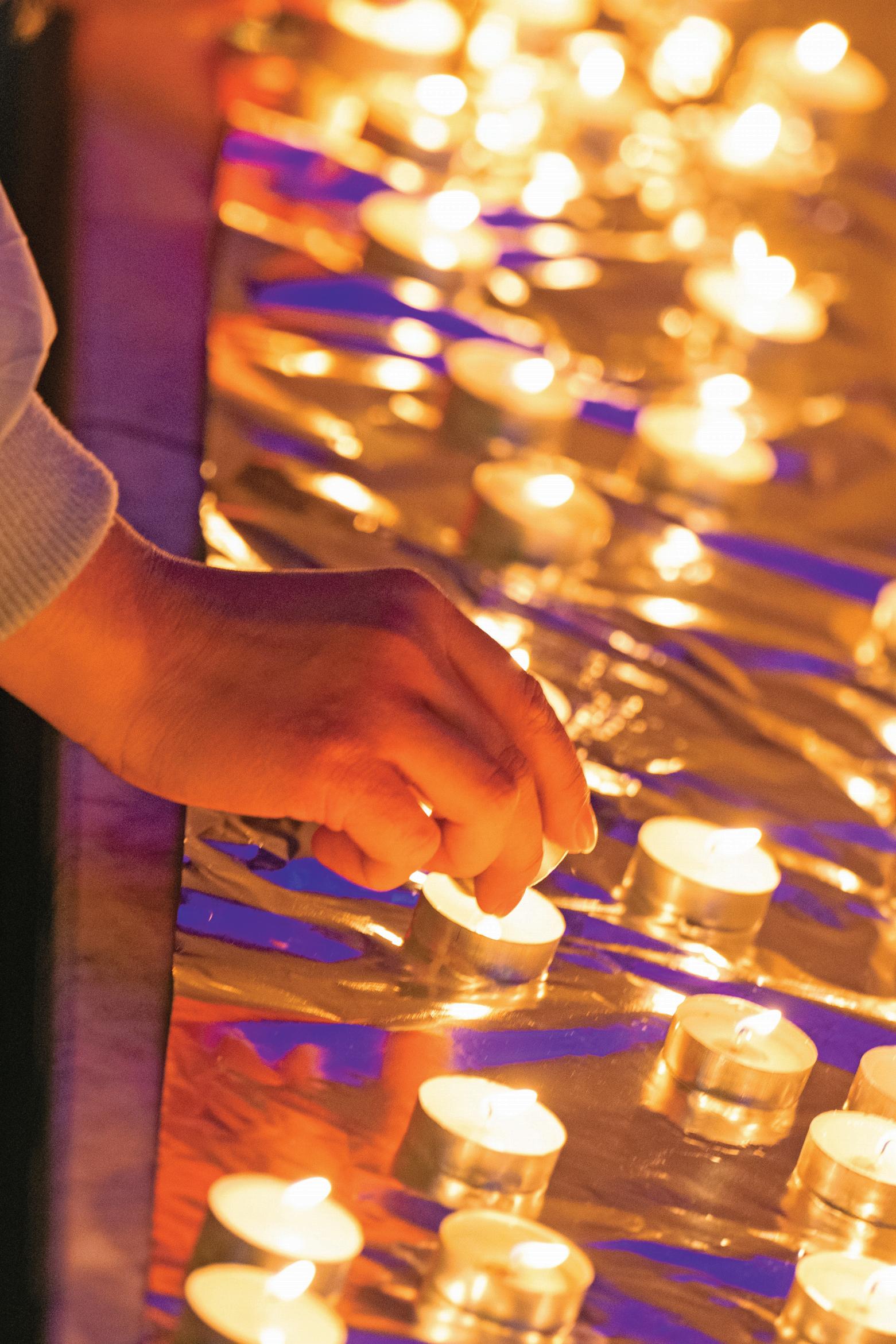
vaticannews.va
Vatican and Microsoft collaborate on AI-enhanced St. Peter's Basilica digital experience.
A partnership between the Vatican and Microsoft gives life to a new digital portal that aims to bring St. Peter’s Basilica closer to the global audience and enhance the experience of pilgrims and visitors
Entitled “St. Peter’s Basilica: AI-Enhanced Experience,” an AI (Artificial Intelligence) enabled project was unveiled recently in collaboration with Microsoft and Iconem, a heritage digitalization company, as the Church prepares for the Jubilee celebrations in 2025.

As speakers at a press conference explained, the digital creation of a replica of St. Peter’s Basilica allows for immersive virtual tours and in-depth digital exhibitions that bring the grandeur of the Renaissance marvel into much sharper focus.
Cardinal Mauro Gambetti, the Archpriest of St. Peter’s Basilica, expressed his delight during the briefing, comparing the experience to gazing at a “starry sky on a summer night.”
“The new tools act like a telescope or spaceship for better viewing,” he said, capturing the essence of this remarkable digital expansion.
A partnership between ancient and modern
The partnership between the Vatican and Microsoft is notable not only for its ambition but also for its innovative use of technology in service of faith and heritage, said Microsoft President Brad Smith, speaking at the press conference.
In an interview with Vatican News’ Fabio Colagrande, Smith reflected on the unique role technology can play in bridging past and present.
“I believe it adds to the spiritual experience of pilgrims coming to Rome,” he said, recalling that “Just going through it myself yesterday, gave me even more insight into the memory of Saint Peter, his life, and what he stood for. It brings that history to life.”
Smith explained that the virtual experience offers a new perspective, allowing viewers to “see parts of the Basilica that one cannot see,” and through the digital exhibit, visitors can access spaces usually out of reach, like the Roman tombs below and intricate artwork in the Basilica’s high dome.
Enhanced accessibility to spiritual heritage
Presenting the initiative, he explained that the virtual replica was created using a cuttingedge drone, camera, and laser scanning technology to capture every detail of the Basilica, followed by advanced AI algorithms to piece together the data. This aims to allow a new generation to engage with the Basilica’s splendour in a format that resonates with them.
“We are taking St. Peter's not just to the world but to a new generation of people, in a language that is more accessible for the times we live in,” said Smith. He emphasized that this accessibility brings spiritual, cultural, and historical significance to people worldwide, even if they cannot physically visit Rome.
Building on shared values
Smith also emphasized the broader significance of this partnership, seeing it as a demonstration of what can be achieved when “people come to a common problem from different points of view, from different areas of expertise.”
Reflecting on the collaboration between an ancient institution like the Vatican and a modern tech company, he remarked: “There’s a story here about what people can accomplish together when they build on each other's strengths and bring out the best in each other.”
He said he hoped this would inspire reflection on the power of collaboration, especially in times that call for deeper understanding across differences.
Faith and technology
Smith agreed that the project highlights the Vatican’s willingness to embrace new technology as a means of advancing faith and making its treasures accessible in ways previously unimaginable.
Addressed the concerns that new technologies like AI could clash with faith, he said “So often, one can start by assuming that new technology is in tension with religion or faith,” but what this project shows, he concluded, is that there is a way to reconcile
this tension. It addresses it in a way that eliminates the tension and “gives people the opportunity to do something bigger than they might have imagined.”
Fabio Colagrande and Linda Bordoni


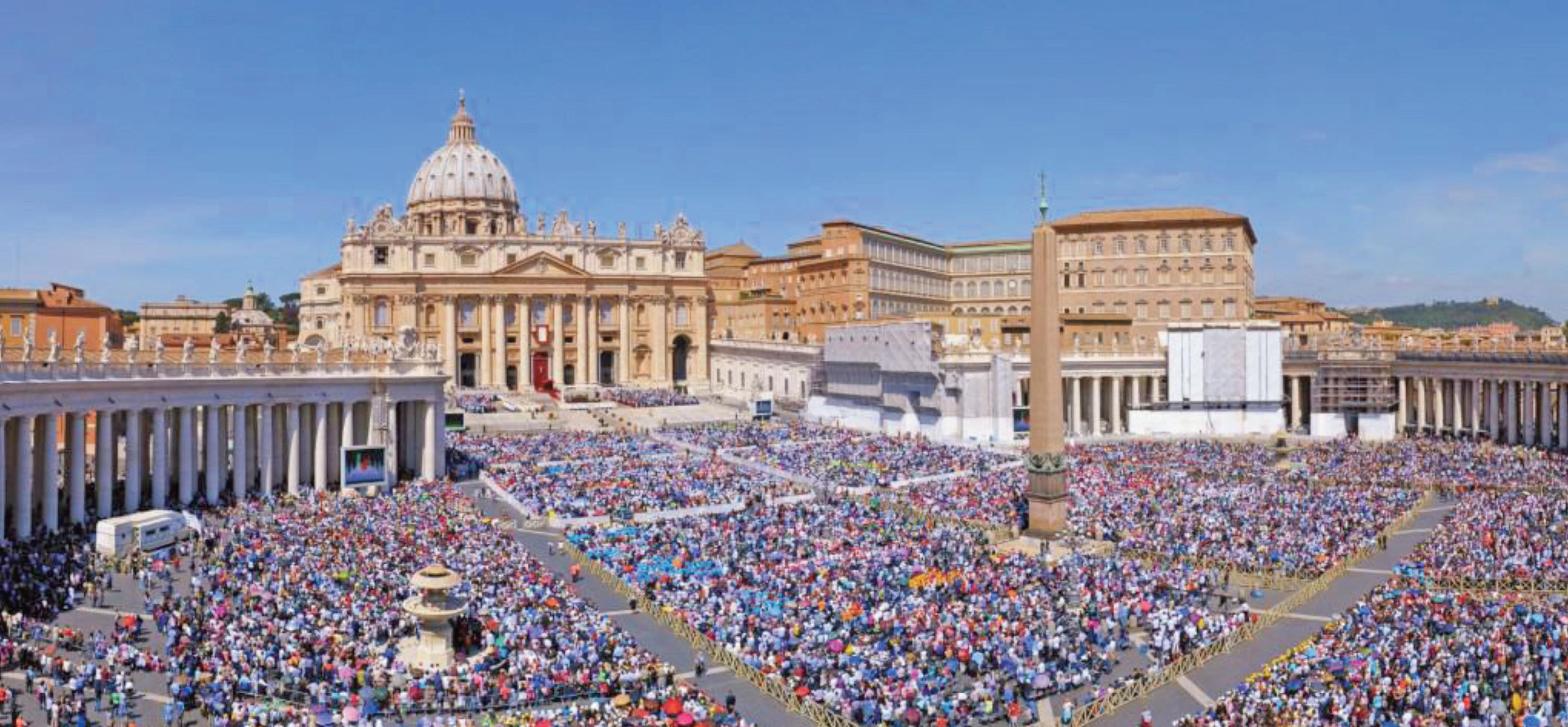
The Jubilee Year 2025, themed "Pilgrims of Hope," is well underway, ushering in a sacred time of faith, renewal, and grace for the global Catholic community. Declared by Pope Francis, this Holy Year unfolds through a series of Jubilee celebrations, each dedicated to different groups and held in various locations throughout the year. These events allow people from all walks of life to embrace the Jubilee’s spiritual message in a deeply personal and transformative way.
At the heart of the Jubilee experience is passing through the Holy Door, a powerful sign of the pilgrim’s spiritual journey. As the faithful cross its threshold, they are reminded of Jesus’ words in John 10:9 “I am the door. If anyone enters by me, he will be saved and will go in and out and find pasture.” Passing through the Holy Door expresses a conscious decision to follow Christ, entrusting oneself to His guidance as the Good Shepherd. While those who travel to the Eternal City will experience this first-hand, the Jubilee is not limited to a physical pilgrimage to St. Peters Basilica. The universal Catholic faithful are invited to participate fully through prayer, live-streamed events, and local celebrations in their parishes and designated Jubilee Churches.
Upcoming Jubilee Events in April
One of the most eagerly awaited events in April is the Jubilee of Teenagers (25-27 April), which coincides with the canonisation of Blessed Carlo Acutis. This momentous occasion will be a source of immense joy and inspiration for young people worldwide. Whether in Rome or at home, these events offer opportunities for prayer, reflection, and spiritual enrichment. Those unable to make the pilgrimage can still fully engage through prayer, online participation, and local celebrations, ensuring that the Jubilee’s spirit reaches every corner of the world.
1. A Time of Grace for Those Who Care and Those in Need
The Jubilee of the Sick and Health Care Workers (5-6 April) is a reminder of Christ’s compassion for the suffering and His call to care for the sick. This event honours patients, medical professionals, caregivers, chaplains, and volunteers who dedicate their lives to healing and service. As Pope Francis continues his recovery, it remains uncertain whether he will personally preside over the events. A solemn Mass is scheduled for 6 April at 9:30 a.m. (UK time) in St. Peter’s Square, offering prayers for the sick and recognising healthcare
workers. The Holy Father has continually emphasised the importance of acts of mercy, which not only alleviate suffering but also foster gratitude and solidarity within communities.
To participate this special Jubilee at home, here are a few suggestions:
• Watch the live-stream of the Jubilee Mass on EWTN or YouTube Vatican News English at 9:30 a.m. (UK time) on 6 April.
• Host a special Jubilee Mass in your parish, honouring the sick and those who care for them.
• Include special Prayers of the Faithful, such as:
* For all medical professionals, caregivers, and chaplains, that they may carry out their mission with wisdom and compassion, let us pray to the Lord.
* For all who are sick, that they may receive comfort, healing, and access to quality healthcare, let us pray to the Lord.
* For Pope Francis, that the Lord may grant him strength and healing, let us pray to the Lord.
• Invite the bishop or priests to bless healthcare professionals and hospital chaplains during local Masses.
• Organise a parish outreach initiative to visit the sick, offer companionship, and provide support to those in hospitals, care facilities, or homebound.
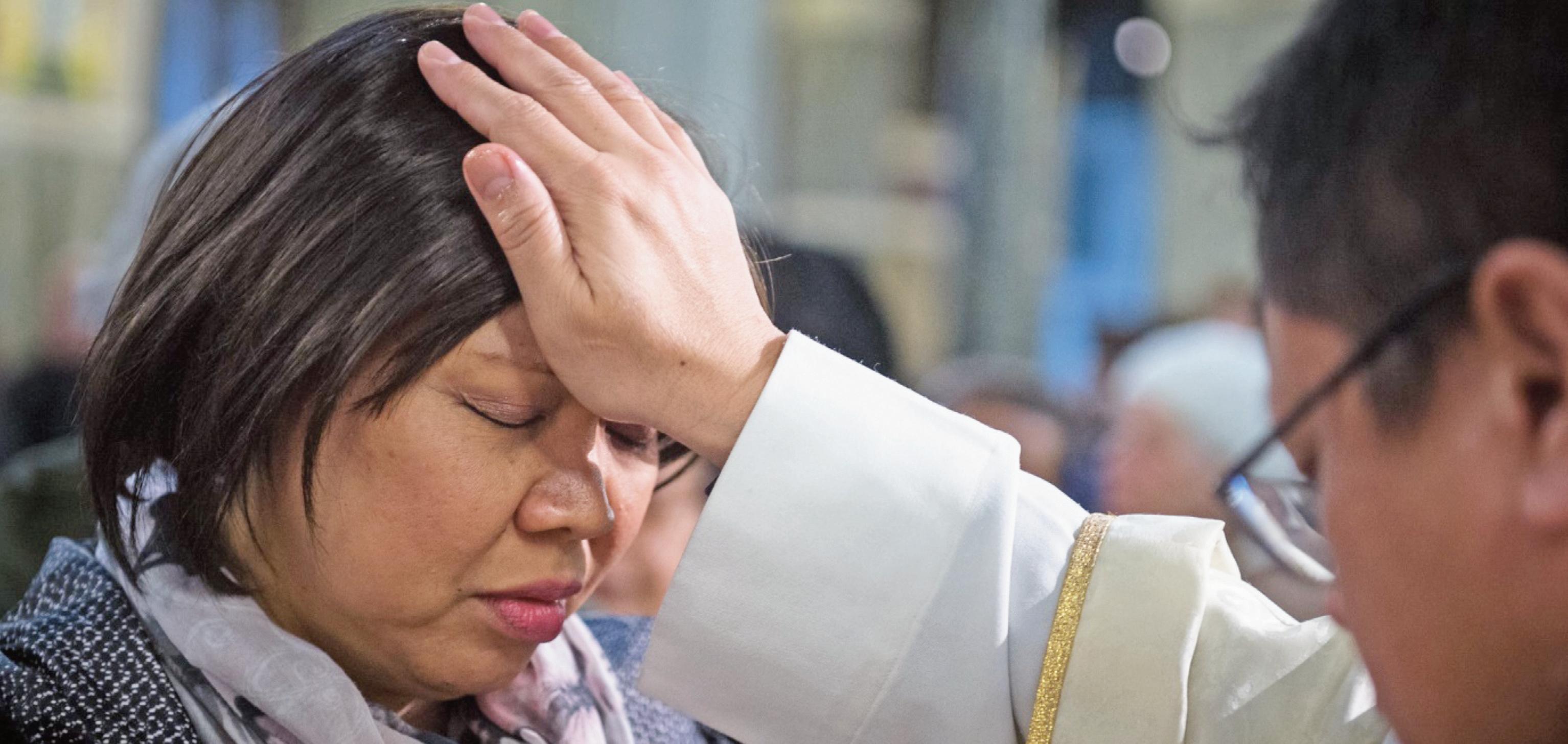
One of the most uplifting events of the Jubilee Year will be the Jubilee of Teenagers (25-27 April). This vibrant gathering will include prayer services, workshops, cultural exchanges, and Eucharistic celebrations, fostering faith, community, and evangelisation.
Interest has been overwhelming, with over 300,000 pilgrims already registered, and Rome is preparing to welcome up to half a million for the Canonisation Mass of Blessed Carlo Acutis. As the first millennial saint, Carlo’s deep love for the Eucharist and innovative use of technology to spread the Gospel have inspired millions worldwide. Known as "God’s Influencer", he continues to capture the hearts of young people. Many dioceses across the UK are organising pilgrimages to Rome and Assisi to be part of this historic moment and to visit Carlo’s tomb. But for those staying at home, here are some ideas to celebrate locally:
• Watch the live-stream of Carlo Acutis' Canonisation Mass on EWTN or YouTube Vatican News English at 9:30 a.m. (UK time) on 27 April.
• Recognise and celebrate teenagers in the parish during weekend liturgies on Divine Mercy Sunday (26-27 April).
• Include a special Prayer of the Faithful: We lift up to You all the young people of the world, especially those gathering for the Jubilee of Teenagers in Rome and in our community. May their hearts be open to Your love, their minds eager to know Your truth, and their lives inspired by the example of Blessed Carlo Acutis, who found his strength and joy in the Eucharist.
• Host a Jubilee Eucharistic Holy Hour, inviting teenagers to lead prayer and witness their faith.
• Plan a local pilgrimage for young people to their Diocesan Cathedral or local Jubilee Church.
• Arrange a parish youth event, including Mass, Holy Hour, and fellowship.
3. A Celebration of Dignity and Inclusion
On 28-29 April, the Jubilee for People with Disabilities will affirm that every person has a place in the Church—not despite their differences, but because of them. This event honours their unique gifts and essential role in the Body of Christ.
Pope Francis, who has used a wheelchair since 2022, has emphasised that disability is not a limitation but an ordinary part of Church life. He calls people with disabilities to be evangelisers, sharing the Gospel through their lives and witness. In his 2022 message for the International Day of Persons with Disabilities, Pope Francis reminded us that no disability— temporary or permanent—diminishes our dignity as children of God. Ideas to celebrate locally are:
• Recognise and honour people with disabilities during weekend liturgies on 26-27 April.
• Include a special Prayer of the Faithful: For all persons with disabilities, especially those participating in the Jubilee for People with Disabilities in Rome and in our community. May their unique gifts enrich the Body of Christ, and may we, as a Church, always recognise their dignity, contributions, and role as evangelisers in spreading the Gospel.
• Plan a local pilgrimage for persons with disabilities to a diocesan cathedral or Jubilee Church.
• Organise a Eucharistic Holy Hour, highlighting prayer and reflection.
Wherever we are, we are all Pilgrims of Hope, called to live out the grace of the Jubilee Year in our daily lives. Whether through pilgrimage, prayer, or acts of service, this sacred time invites us to renew our faith, embrace hope, and strengthen our bonds as the Body of Christ.
As we mark the Jubilee of the Sick and Health Care Workers and the Jubilee for People with Disabilities this April, let us pray in a special way for Pope Francis, asking the Lord to grant him strength and healing as he continues to guide the Church with wisdom and compassion.
Let us also honour and encourage the young people in our parishes this month. They are the future of the Church, and our hope lies in them. Like Carlo, may they be inspired by the Eucharist, grow in faith, and boldly share the Gospel in today’s world.
If you feel inspired to bring the Jubilee into your local community, speak to your parish priest and fellow parishioners to build interest and plan meaningful celebrations. This is our Church, and by coming together in faith, we ensure that the spirit of the Jubilee—one of mercy, inclusion, and renewal—reaches every heart and home.
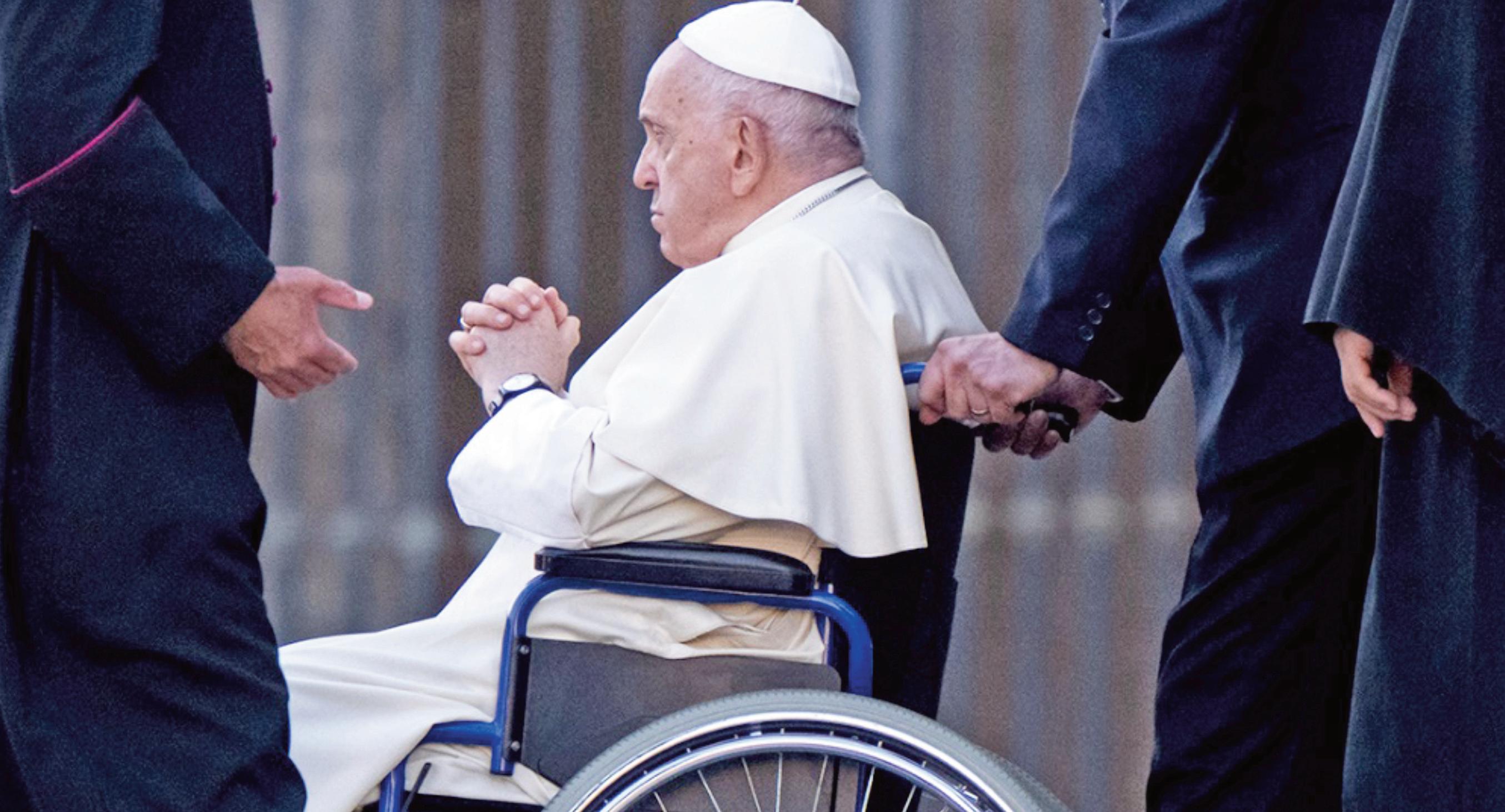

Father in heaven, may faith you have given us in your son, Jesus Christ, our brother, and the flame of charity enkindled in our hearts by the Holy Spirit, reawaken in us the blessed hope for the coming of your Kingdom.
May your grace transform us into tireless cultivators of the seeds of the Gospel. May those seeds transform from within both humanity and the whole cosmos in the sure expectation of a new heaven and a new earth, when, with the powers of Evil vanquished, your glory will shine eternally.
May the grace of the Jubilee reawaken in us, Pilgrims of Hope, a yearning for the treasures of heaven. May that same grace spread the joy and peace of our Redeemer throughout the earth. To you our God, eternally blessed, be glory and praise for ever.
Amen

Pope Francis has recently been released from hospital but whist there, sent this message as part of his Angelus address:
Sisters and brothers, I am still sending you these thoughts from the hospital, where as you know I have been for several days, accompanied by doctors and healthcare professionals, whom I thank for the attention with which they are taking care of me. I feel in my heart the “blessing” that is hidden within frailty, because it is precisely in these moments that we learn even more to trust in the Lord; at the same time, I thank God for giving me the opportunity to share in body and spirit the condition of so many sick and suffering people.
I would like to thank you for the prayers, which rise up to the Lord from the hearts of so many faithful from many parts of the world: I feel all your affection and closeness and, at this particular time, I feel as if I am “carried” and supported by all God’s people. Thank you all!
I pray for you too. And I pray above all for peace. From here, war appears even more absurd. Let us pray for tormented Ukraine, Palestine, Israel, Lebanon, Myanmar, Sudan and Kivu.
Let us entrust ourselves confidently to Mary, our Mother. Happy Sunday, and arrivederci.
+ Pope Francis

liverpoolcatholic.org.uk
The Justice and Peace Youth Group at Bishop Eton and St Mary's empowers young people to make a difference.
Justice and Peace groups are not just the preserve of adult parishioners. That is the lesson from the young people of the twin parishes of Our Lady of the Annunciation, Bishop Eton, and St Mary’s, Woolton, where a Justice and Peace Youth Group has been thriving for nine years now.
The group is made up of around 40 youngsters, aged between nine and 18, who meet up twice a month to learn, pray and play together. And their shared goal, according to longstanding member Harriet Paes, is “to make a difference based on our Christian values”.
The group was formed after Father Tim Buckley, the parish priest, organised an ‘Awakening Day’ to bring out the gifts and talents of parishioners and boost the number of activities taking place. According to Harriet, “members usually join after they have made their First Holy Communion and reluctantly leave when they go to university!”
Explaining more, she adds: “We invite different charities to come to talk to us and then we try to help. Last autumn, for example, we had a talk from SHARe Knowsley about the difficulties faced by refugees. We then began collecting trainers to give them, to keep their feet warm now that they’ve come to our colder climate.
“Meanwhile, Anna Houghton came in to tell us about Mary’s Meals, and we led a project to get
our parishioners to save £19.15 over a fortnight, as this is the amount of money it takes to feed a child at school in a developing country for a whole year. We spoke at several Masses about this, and our parishioners were very generous!”
Other groups they have shared activities with include the SVP, CAFOD, the RSPB, Nugent Care and St Paul’s Eye Hospital. And there have been learning opportunities too, such as when the group attended a session on resuscitation and emergency first aid given by doctors at the Royal Liverpool University Hospital.
Harriet continues: “We have also held Youth Masses for a number of years now on Youth Sunday, and we organise table sales and have sponsored walks to raise money for different charities.
“In addition, we sing and play instruments at a local old people’s home and collect items for a foodbank. We pray together too, and spend time meditating and reflecting on the teachings of Jesus and the lives of the Saints. But it’s not all hard work! We go bowling and have games nights as well.”
To join the Justice and Peace Youth Group at BishopEton/St Mary’s, or seek advice on setting up your own group, please contact semoorhead@hotmail.com.
St Anselm of Canterbury, a towering figure in medieval theology and philosophy, remains one of the most influential thinkers of the Middle Ages. Born around 1033 in Aosta, Italy, Anselm became a Benedictine monk, abbot, and eventually Archbishop of Canterbury. His intellectual legacy, however, transcends his religious leadership.
Anselm is perhaps best known for his ontological argument for the existence of God. This groundbreaking argument suggests that the very concept of a perfect being implies its existence. According to Anselm, a being that exists in the mind and in reality must be greater than one that exists only in the mind. His argument laid the groundwork for future theological and philosophical debates on the nature of God and existence.
In addition to his philosophical contributions, Anselm was a fierce advocate for the autonomy of the Church. During his tenure as Archbishop of Canterbury, he faced conflicts with English monarchs, notably King William II and King Henry I, over the power of the Church. Despite these challenges, Anselm remained steadfast in his beliefs, defending the Church’s rights and establishing himself as a key figure in the ongoing struggle for ecclesiastical independence.
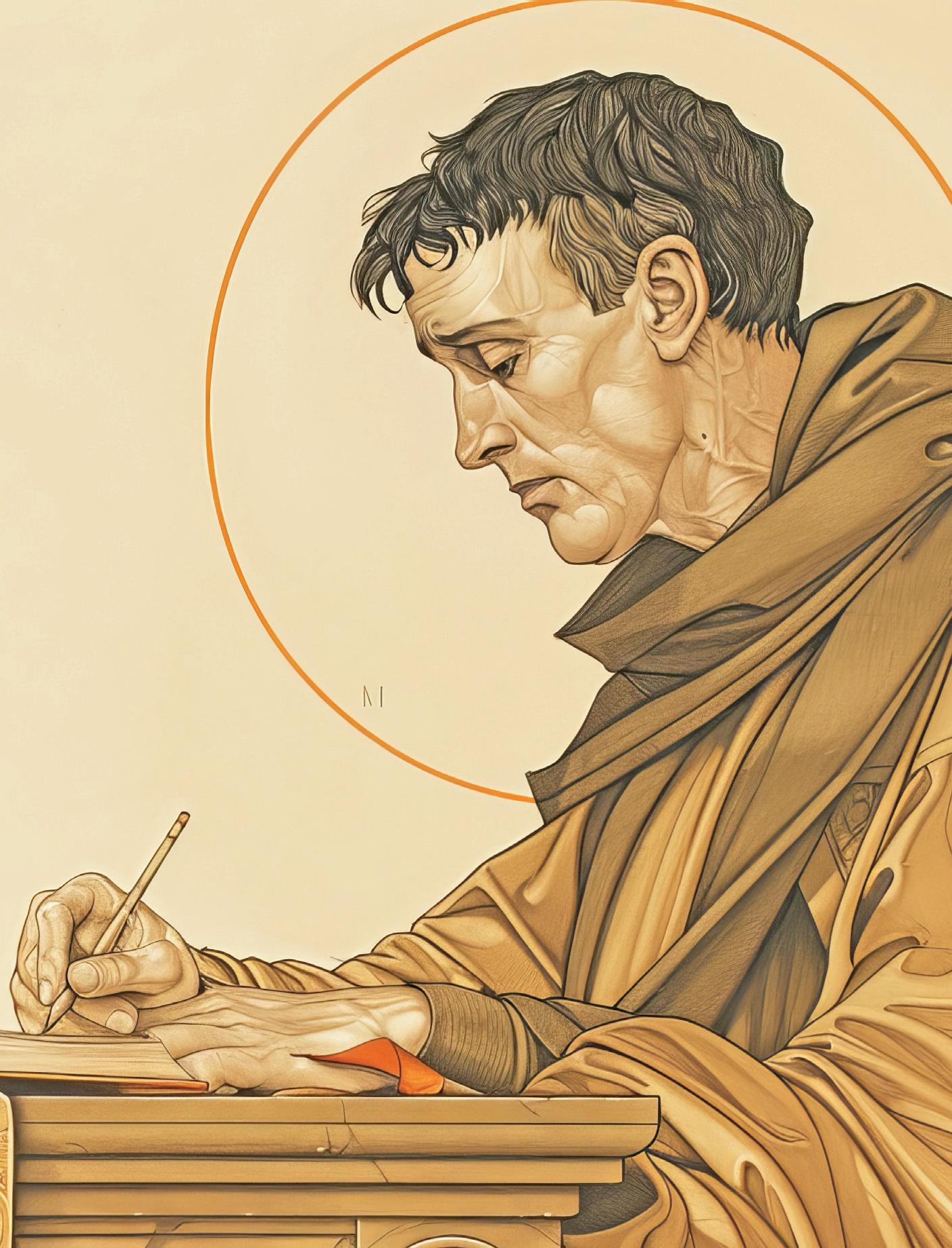
Anselm’s theological works also delved into the nature of redemption. His Cur Deus Homo ("Why God Became Man") offered a profound explanation of why Christ's incarnation and sacrifice were necessary for the salvation of humanity. This work remains a foundational text in Christian theology.
Canonized as a saint in 1494, St Anselm’s ideas continue to shape Christian thought and philosophy today. His intellectual brilliance, devotion to the Church, and commitment to faith have left an enduring legacy that stretches far beyond the Middle Ages.
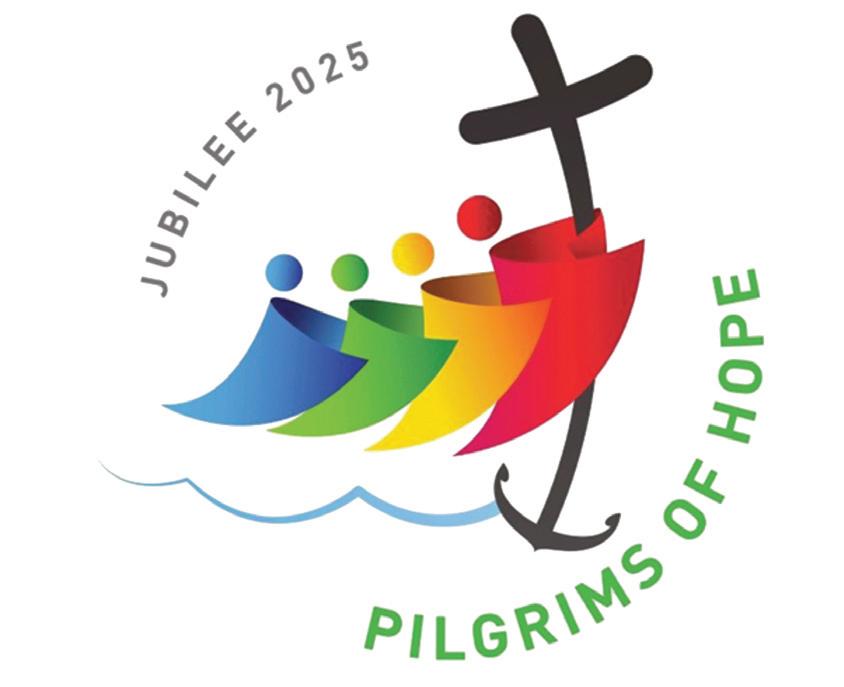
northamptondiocese.org
Bishop Oakley thanked volunteers for their essential role in enriching
As the global Catholic community prepared to celebrate the Jubilee of Volunteering on March 8-9, Bishop David Oakley of Northampton issued a heartfelt letter of thanks to the countless volunteers who serve within the diocese. In his message, Bishop Oakley acknowledged the indispensable role of volunteers in enriching the life of the Church at both local and diocesan levels.
Highlighting his experiences during pastoral visits, Bishop Oakley expressed admiration for the faithful who embody the Church’s mission through their devotion and service. He invoked the scriptural metaphor of “living stones” to illustrate how, through collective generosity, the Church becomes a dynamic and life-giving community.
The bishop’s letter also recognized the diverse forms of volunteerism within the diocese, including social action, evangelization, formation activities, catechesis, liturgical
involvement, and prayer ministries. He emphasized that such dedication ensures the Church remains vibrant and steadfast in its mission.
The Vatican’s Jubilee of Volunteering aims to honor and encourage those who selflessly contribute their time and talents to serve others, reflecting the Church’s commitment to charity and community engagement. Bishop Oakley’s message serves as a local testament to this global celebration, shining a light on the volunteers whose efforts are foundational to the Church’s presence and impact in the community.
The Diocese of Northampton encompasses a diverse and active community, with volunteers playing critical roles in various ministries and services. Bishop Oakley’s acknowledgment reinforces the value of their contributions and the collective strength derived from their unwavering commitment.
As the Jubilee of Volunteering approaches, the diocese joins the universal Church in celebrating and giving thanks for the volunteers whose generosity and service continue to build and sustain the faith community.

Dear
and sisters in Christ,
As we join the universal Church in celebrating the Jubilee of Volunteering this weekend, I wish to express my heartfelt gratitude to the thousands of volunteers across our diocese who generously offer their skills and time to enrich the life of the Church in our local communities and at a diocesan level.
In my pastoral visits to parishes, I am continually inspired by the faithful who, through their devotion and service, embody
the very heartbeat of our mission. Recalling the scriptural image of “living stones,” we recognize that together, through your generosity, we form a living, breathing Church. Whether you contribute through social action, evangelisation, formation activities, catechesis, liturgical involvement, prayer, or any of the other vital ministries within our parishes and diocesan departments, please accept my sincere thanks. Your dedication ensures that our Church remains vibrant and steadfast in its mission.
Yours devotedly in Christ, +David Oakley Bishop of Northampton
cbcew.org.uk
“Taking action at local or national levels is an important gospel imperative when those around us suffer in silence or without hope of real change.”
Bishops Peter Brignall and Richard Moth have both praised a new resource produced by the Bishops’ Conference and the God Who Speaks, Turning Tables, which helps Catholics use Scripture and their faith to inspire effective social justice action.
Bishop Brignall said that God calls all of us to care for others, and that the new resource can help Catholics take action in line with the Gospel. He said: “Taking action at local or national levels is an important gospel imperative when those around us suffer in silence or without hope of real change.
“This practical guide shows how you can help to transform society starting from the Bible and the teachings of Jesus, through to how to contact your Member of Parliament or campaign on an issue – to have a ‘way of life marked by the flavour of the Gospel.’”
Bishop Brignall added: “Scripture encourages us to speak out for those who cannot speak, defend the rights of those who suffer and are vulnerable, and to challenge the status quo. This can feel like a huge challenge and not easy to achieve, so this resource helps you to put your faith into action.
“With a biblical foundation and plenty of practical examples ‘Turning Tables’ is the ideal resource for Catholics who want to transform society with faith and integrity – to make the Word of God ‘the beating -heart of every ecclesial activity.’”
Turning Tables is rich with advice on how to improve the lives of those around us, and to ensure that we have a demonstrable, positive impact on society.

Bishop Moth, writing in the foreword of the resource, said that by drawing on Catholic Social Teaching, Turning Tables is opening up a precious gift to a wider audience: “I am pleased to commend this resource as a means to explore the riches of Catholic Social Teaching, grounded in the Scriptures.
“While it has often been said that Catholic Social Teaching is a ‘well-kept secret’, this is perhaps no longer the case as increasing numbers of people across society are finding in the Church’s social teaching a response to the challenges of the age.
“Thanks go to all those who have been involved in the production of this new resource which will surely open Catholic Social Teaching to a yet wider audience.”
To find out more scan the QR Code below:

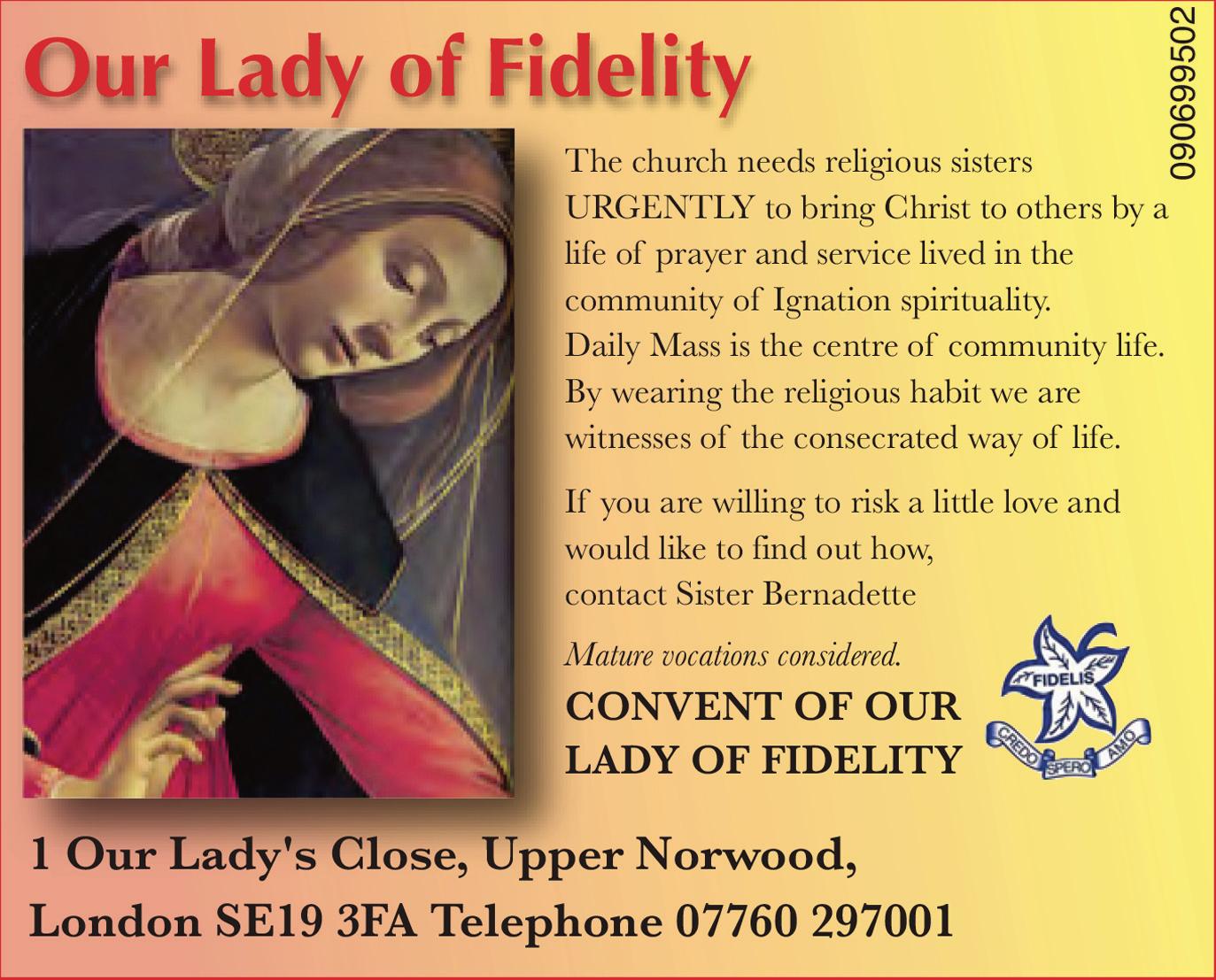

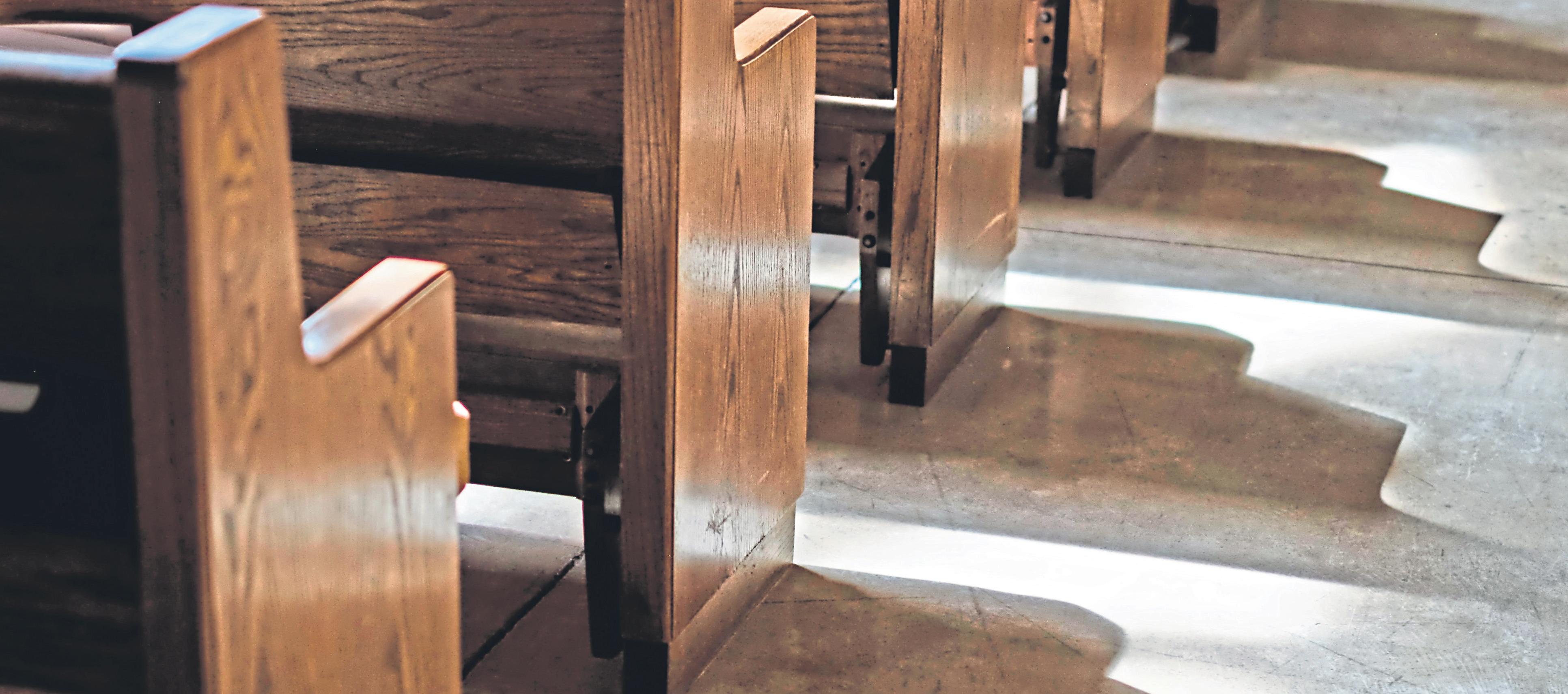

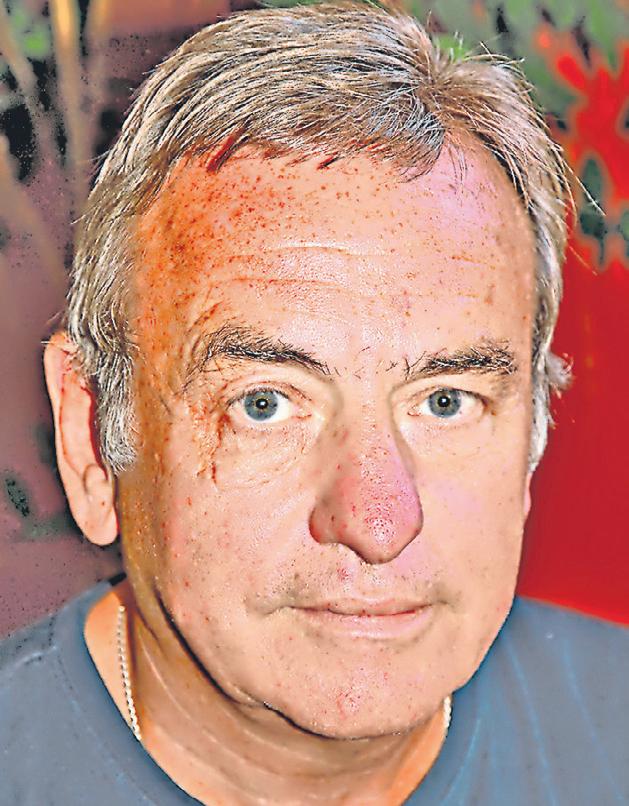
Dr Jay Kettle-Williams
Judas Iscariot intrigues me, and for reasons even preceding his arrival on the scene.


























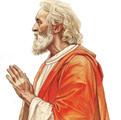
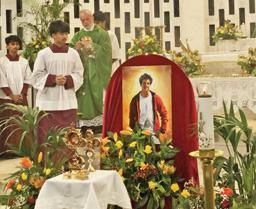





Gaius Julius Caesar was born one hundred years before Christ. Christ may well have known about Caesar and the Ides of March, a time associated with misfortune and doomaround 15 March in our Gregorian calendarwhen Caesar was assassinated in 44 BC. Christ may well have learned of the assassination and of Brutus’ hand in the deed but the term ‘Et tu, Brute’, as popularised in the play Julius Caesar by William Shakespeare (1564 – 1616), may not have so readily come to His mind. Brutus had been seen as a supporter of Caesar. So, who was to know that he had it in him to do what he did? What resentment he must have harboured and let fester in his heart, resentment which was to bind him to the other conspirators.
Judas Iscariot, just as Christ and the other disciples, was a subject of the Roman Empire which Caesar had helped to develop and consolidate. The name ‘Iscariot’, perhaps being a descriptor of some type, defies any firm consensus as to its meaning or significance. Could it refer to a personal characteristic, place of provenance or a group identity as is the long-established practice here in the UK and elsewhere? A probability proposed in some quarters is that Judas was Ish Kerioth ( > Iscariot?), a ‘man from [the town of] Kerioth’ of the tribe of Judah (Joshua 15:2527). But of the life of Judas before the appearance of his name in the lists of the apostles absolutely nothing is known.

I am certainly no Bible scholar, not by a long chalk. However, when it comes to Judas’ character, some maintain that he could have been a sort of Barabbas, a bit of a brigand, on the reflection that not all the disciples came from backgrounds deemed whiter than white. So, is what Judas did by betraying Jesus any indication or reflection of his character? The existentialist argument that we are the sum of our acts could hold firm at this point. On the other hand, Judas, irrespective of his true nature, could have been simply trapped in and trapped by inevitability, a hostage to the

destiny with which, as Jesus recognised, Judas was going to comply: ’What you are going to do, do quickly’ (John 13:27 JB).
Judas couldn’t have been a totally bad guy, surely. After all, Jesus had picked him to be one of the twelve, the group reputedly symbolic of the twelve tribes of Israel which were named after the 12 sons of Jacob, the grandson of Abraham. According to biblical texts, Jacob (also known as Israel) was chosen by God to be the patriarch of the Israelite nation. His twelve sons form the patriarchs for the twelve tribes of Israel. Listed oldest to youngest those sons were: Reuben, Simeon, Levi, Judah, Dan, Naphtali, Gad, Asher, Issachar, Zebulun, Joseph and Benjamin. According to the Hebrew Bible or Tanakh also known in Hebrew as Miqra, the tribe of Judah, and to which Judas would have belonged, was the first tribe to take its place in the Land of Israel where it was to be found in the southern region. It was a member of that first tribe who was then destined to betray Jesus and subsequently to commit suicide.
Judas’ fate, however his suicide was prompted and administered, could have been down to his character or otherwise dictated, forced upon him by circumstance. Was it to atone that he tried to return those pieces of silver? Albeit an oblique reference to ’nature or nurture’, we are
surely faced with a dilemma: are we looking at Judas’ remorse for the inevitable deed he was to commit or his despair at the predicament he had been obliged to create, figuring so prominently in the ensuing scenario?
One thing is for sure: without Judas as a major actor, crucial in triggering Jesus’ path to crucifixion, the Easter story of resurrection as we know it would not be there for us.
So, Happy Easter to one and all!
Acknowledgements and Attribution: Accompanying image (Statue with Blowing Horn) after the sculpture Exultate Jubilate by Philip Jackson. Texts/References adapted and/or adopted from http://en.wikipedia.org under the terms of the Creative Commons Attribution-ShareAlike License 4.0: http://creativecommons.org/licenses/bysa/4.0/; Photograph (Unsplash): Pieces of Silver (with grateful thanks to https://zlataky.cz)

Dr J L Kettle-Williams is an experienced business communications consultant and wordsmith (tutor, writer, translator).

Kayleigh overcame severe injury through determination and support, achieving remarkable recovery and new goals
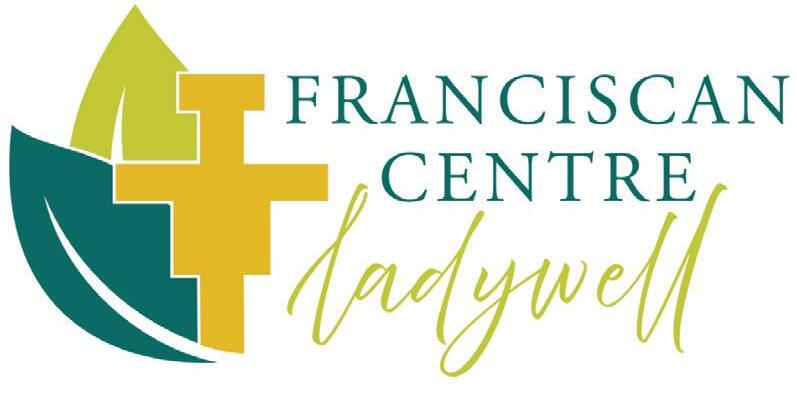

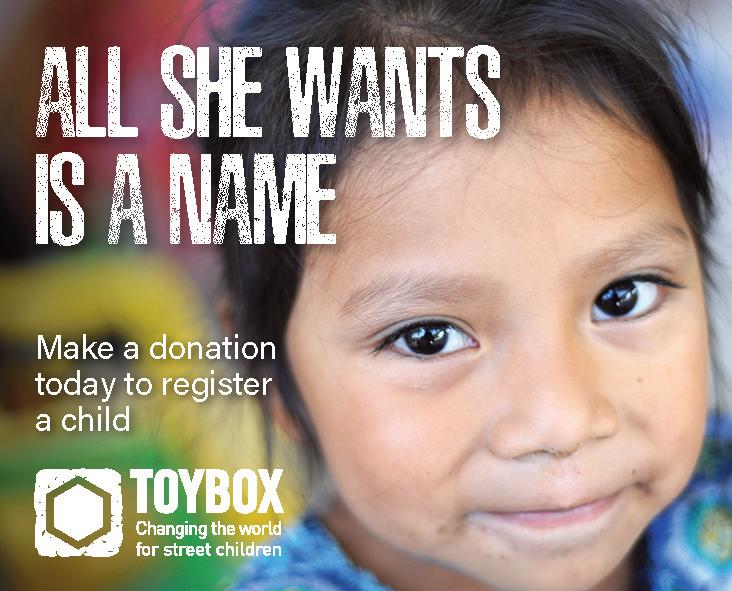




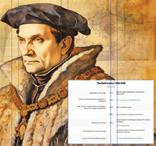
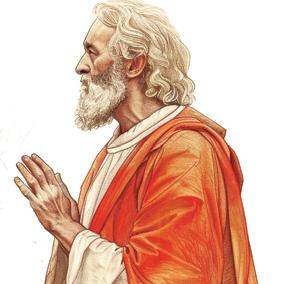

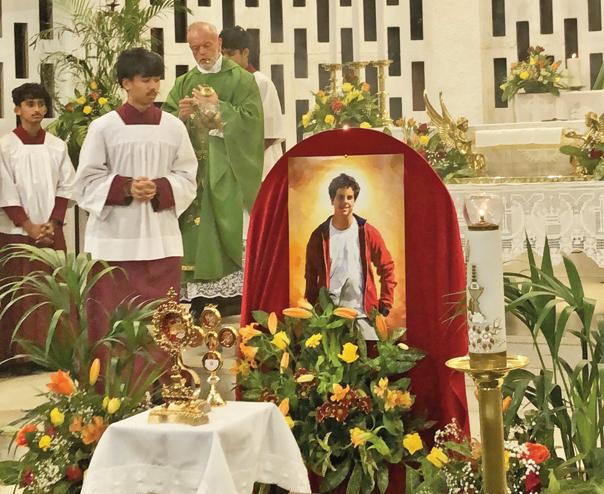
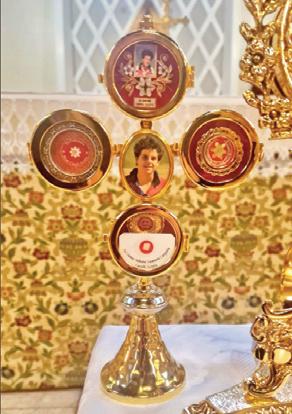


Before departing for Canada, Kayleigh said: “Having sustained a complicated knee and abdiocese.org.uk
nerve injury from a simple ski accident 2 years ago, I could never have predicted I'd be in this position now. Hours and hours in the gym, surgery, inpatient rehab, determination, tears and laughter have all paid off! I've put every possible effort into my rehab to walk again without aids, without medication and with purpose!
Many congratulations to our Lourdes Pilgrimage Lead Accueil Notre Dame Nurse, Kayleigh Pierce (nicknamed "K-Bomb"), who won Gold in the "Women's Novice Alpine Sit Ski" at the 2025 Invictus Games in Canada. Kayleigh, who is an RAF Nursing Officer and Flight Lieutenant, competed in wheelchair basketball, indoor rowing and was even captain for alpine skiing.
“Through support from friends, family, DMRC, adaptive sport and Invictus I've exceeded my expectations of recovery, and I'm hoping to be back in work very soon. To all of the people who have been there along my journey: I cannot express how much your support has meant to me. Thank you so much."
The Invictus Games Foundation supports the recovery and rehabilitation of international wounded injured and sick service personnel and veterans through sport. "Invictus" means "Unconquered" and the term embodies the
fighting spirit of the participating men and women, as well as their motivation to move on with their lives, to gain a new place in life, and to not let themselves be defined by the trauma they have suffered.
Through providing sport recovery opportunities and adventurous challenge, the Foundation’s work supports long term improvements in physical and mental health, inspires change and motivates wider society, and helps wounded injured and sick service personnel and veterans reconnect with their families and communities.
The 2025 Winter Games included Alpine Skiing, Snowboarding, Skeleton and Wheelchair Curling, in addition to the core Invictus games of indoor rowing, sitting volleyball, swimming, wheelchair rugby and wheelchair basketball, with more than 500 competitors from 20 nations taking part.

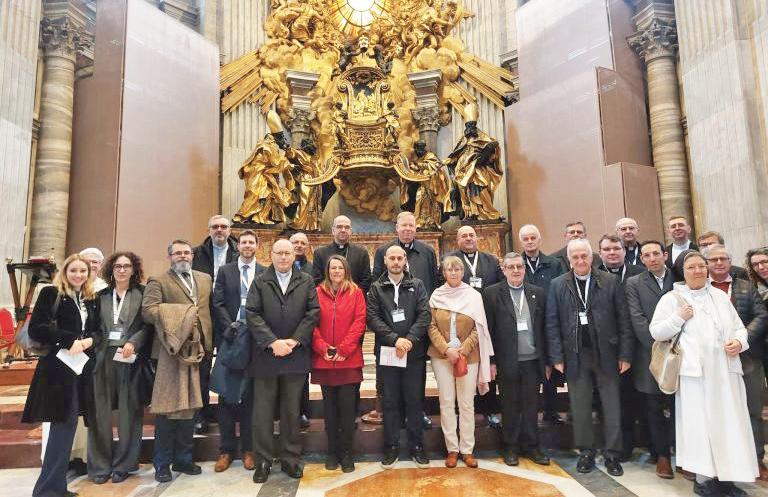
CCEE discusses new economic approach based on Catholic social teaching for global justice and solidarity
The Section for Social Issues of the Council of Bishops' Conferences of Europe (CCEE) held its meeting on 6-8 March in Rome on the theme: 'A new way of doing economics'.
Experts in economics and in the social doctrine of the Catholic Church, along with representatives of the Bishops' Conferences of Europe, discussed how the spirit of the Gospel, the Good News about love and justice could inspire a more just world economy for the benefit of all, especially the poorest.
The social teaching of the Catholic Church emphasises the legitimacy of private property - which provides a sphere of freedom for the individual, for the family, and increases the productivity of goods -, but at the same time upholds the principle of the "Universal
destination of goods". The goods of the Earth should serve the well-being of all, especially of the poor, of the weak, of the disadvantaged.
The Catholic Church emphasizes that the ultimate goal of economy should not be profit maximization, but the common good, the fulfilment of each single person. Therefore the markets - preserving their just, but not absolute autonomy - should be regulated according to moral rules. The states should strive to create full employment.
However, the regulations of the world economy today are quite often far away from these principles. As Pope Francis said: "Just as the commandment 'Thou shalt not kill' sets a clear limit to safeguard the value of human life, today we also have to say 'thou shalt not' to an economy of exclusion and inequality. Such an economy kills”.
The representatives of the CCEE Commission call the decision makers and every person of good will to implement the inspirations of the Gospel into the concrete reality of world economy, of politics, of laws and of daily life. We ask our Christian brothers and sisters to become the salt of the Earth in the field of social justice, too, creating a more just world economy. We especially ask the developed countries, the great owners and corporations to pay the 'social mortgage' that is attached to their private properties and to their gains. We ask the parliaments of every nation and the United Nations to implement the values of justice and solidarity in their legislations more and more.
Let us make the Earth a better place for humanity as a whole; especially for those, who have no access to clean water, to sufficient nutrition, to education and healthcare! When the more developed nations and individuals can do that, their lives and their societies will turn out to be more human, fuller, and happy. Humankind is one family, we are essentially
social beings, and we can be happy only together.
The option for the poor is not optional, it cannot be delegated to special organs of the Church or of society. The pastors in the Church should accompany in a pastoral way agents of economic life, but also their communities to discover the obstacles that hinder their integral human development. In this pastoral effort they must listen to them, first of all they have to listen to the poor, to the suffering.
Humanity should break those "structures of sin" - to use the expression of Saint John Paul II. - which lead to inequality and exclusion. Such structures of sin are among others the surcharging of the poor countries, the tax havens, or the monopoly of a few in the field of high-tech industry and communication.
The prophet Isaiah says: "The fruit of justice is peace" (Is 32,17). If we desire peace, we must create a more just world. The Jubilee Year calls humanity to build up a new world economy, an economy of solidarity that really serves the well-being of all.
Caritas Deaf Service
Suddenly someone near me who I didn't recognise started signing… I nearly fell off my chair!
As Sign Language Week 2025 draws to a close, we're sharing a reflection by Sr Marika Rebicsek OCV, part of the Caritas Deaf Service community, about her experiences as a Deaf person in the Church and the importance of learning British Sign Language (BSL) to foster inclusive communities.
Every month, my Hearing Dog Angus and I embark on a journey of up to five hours roundtrip, navigating several trains and buses with my electric wheelchair, to get to Westminster Cathedral for the Deaf Community Mass. Let me tell you why.
I was born profoundly Deaf, and was blessed to be among the lucky Deaf children who have wonderful parents to support them. My mother taught me to read, write, lipread and speak. But lipreading is extremely difficult, and even the best lipreader struggles; it's 25% what you see, and 75% guesswork. It's exhausting; one gives up after 10 minutes, and it makes it even more of a challenge is that the average parishioner isn't Deaf aware, and has no idea how to articulate to enable Deaf parishioners to understand.
I could opt for a hearing aid, but for the majority of severely or profoundly Deaf people, loop systems are useless. And in church, where parts of the Mass are sung or there is quiet music playing, the acoustics are anything but helpful to hearing aid and cochlear implant users.
Perhaps I could follow along with the readings on an app, like Universalis? It is possible; but if you can't lipread the priest or reader, you will still be lost. By the time I find my place, the Gospel has finished, and we're almost at the Consecration.
There are also speech-to-text transcribing apps, but they don't recognise religious terms very well. Indeed, mine once suggested that we were to have “cows by candlelight" before Christmas, and replaced "offered up" with “bottoms up" in the Eucharistic Prayer… I expect Our Lord had a good laugh!
Despite moments of comic relief, all this was deeply frustrating to me; I didn't feel part of the community. So, while in my teens, I decided that the only way forward was to learn BSL.
Eventually, I met other Catholics in the Deaf Community, and the first Signed Mass I attended in 1977 totally blew me away. Prayer was visual! Finally, for one Sunday a month at the Deaf Community Mass in Westminster, I felt I was wanted in church.

All my friends sign, because that is the only way I can communicate on par with a hearing person. Did you know that on average, a profoundly Deaf 16-year-old leaves school with a reading age of nine and three quarters? How, then, are they supposed to engage in something as wondrously complex as the life of the Church?
My local parish is just six minutes' walk away, and how I do wish there were someone there who can sign. I feel so excluded, whether it's at coffee mornings on Sundays where I can't lipread, trying and failing to use speech-to-text in the noisy church hall, or having to pass on Scripture study, TV nights, trips and quiz nights. My Hearing Dog reminds people they need to take extra care when speaking around me, but still, nobody can relay things to me. It feels like being trapped in a glass bubble looking on as the world goes by.
Two weeks ago, after Sunday Mass at my parish, there was a big party for a parishioner who was turning 90. Suddenly someone near me who I didn't recognise started signing… I nearly fell off my chair! She was fluent L2 signed, and part of a signing choir! Hope at last, I thought to myself. Maybe she can help me at Mass?
Alas, she lives two parishes away, and was only there for the party. So my search for someone who can sign, someone who can help me, continues.
The Caritas Deaf Service works to enable individuals who are Deaf, Deafblind and Hard of Hearing to participate fully in the life of the Church. It does this by running regular Signed Masses, Bible Study sessions, social events, trips and pilgrimages tailored to the needs of the Deaf Community.
Sr Marika Rebicsek
indcatholicnews.com
An American Catholic speaks her mind in this week's All Kinds of Catholic podcast episode. Judy says, 'I'm pretty turned off by the Catholic Church's refusal to allow women full leadership roles and it makes it really hard to sit through services. Certainly the church here in the United States, all over the world, has done profound damage to children and vulnerable people and it's part of the power thing.' The conversation turns to the current political upheaval in America which Judy characterises as, 'sickening and heartbreaking.' Nevertheless, faith helps her to find hope: 'People are gonna keep showing up and taking care of each other and resisting and praying, and those are all lights - and the darkness shall not overcome it.' (Episode 43 The Light Shines in the Darkness, All Kinds of Catholic podcast).
Podcast host Theresa Alessandro recounts how she was asked recently if being part of the weekly conversations has changed her. 'It absolutely has,' she says. 'It's a privilege to encounter so many Catholic people who I might otherwise never have met. I thought I understood what being a Catholic is like but every week I hear things that connect with my experience and things that make me look again at what I thought I knew.'

Here's what one listener said about recent episodes, ‘So many of them so different in so many ways from me - but that is what I love. Hearing how different people find God in their lives is immensely inspiring. I'm very seldom able to get to church nowadays because of my health. So your podcast provides me with a way of, virtually, meeting brothers and sisters.'
Do find the podcast on all the usual platforms, as well as YouTube and Facebook. This is an opportunity to share in what Pope Francis, in Evangelii Gaudium, calls, 'a genuine experience of fraternity, a caravan of solidarity.' Catch up now on how Catholic people are marking Lent - then you will be ready for the fantastic episodes planned for Holy Week and Eastertide. Subscribe (free) on your podcast app and stay tuned to hear more about the exciting developments planned during this Jubilee year. Soon listeners will be able to choose to engage more closely with the conversations and with each other.
On Saturday 1st March, the Association of the Teachers of Catholic RE (ATCRE) hosted their 6th National conference at St Thomas Aquinas Catholic School, Birmingham. The aim of ATCRE is to serve all those teaching RE in Catholic schools by providing high quality professional development and numerous opportunities for networking and collaboration.
The event began with a liturgy celebrating the feast of St David of Wales, followed by the first keynote speaker, Brendan Thompson, Program Director of Word on Fire UK. He opened his talk by asking, "How central is the Bible in the life of your school?" Thompson then explored the challenges of reading the Bible and the interpretative lenses provided by the Church's traditionthrough the saints, prophets, popes, and doctors of the Church. He noted that the vision of Vatican II for an authentic Catholic biblical renaissance remains unfulfilled but is beginning to take shape. Catholic schools, he emphasised, will play a key role in this renewal, particularly with the increased focus on scripture in the new Religious Education Directory (RED).
Thompson also reminded the teachers in attendance that Catholic schools are the Church's "Largest mission field, and greatest potential for transformation."
Seminars followed by speakers Lat Blaylock (RE Today), Andy Lewis (St Bonaventure's), Stuart Ford (The Bible Society), Dr Katie Woolstenhulme (Durham University), Theresa Kehoe (Aid to the Church in Need), Matthew Dell (St Mary's), Greg Finn (Mark 10 Mission), Susan Docherty (Newman University), and Peter Privett and Dr Sue Price (Godly Play UK).
The final keynote speaker, Professor Bob Bowie, emphasised that placing Scripture at the heart of Catholic education is about "meaning, not just interpretation." He described the Bible as a gift to the world, meant to be shared with everyone-including those who learn and work in Catholic schools. Bowie highlighted that Scripture provides a lifelong source of strength in the face of life's challenges and serves as a constant reminder of the fundamental importance of justice.
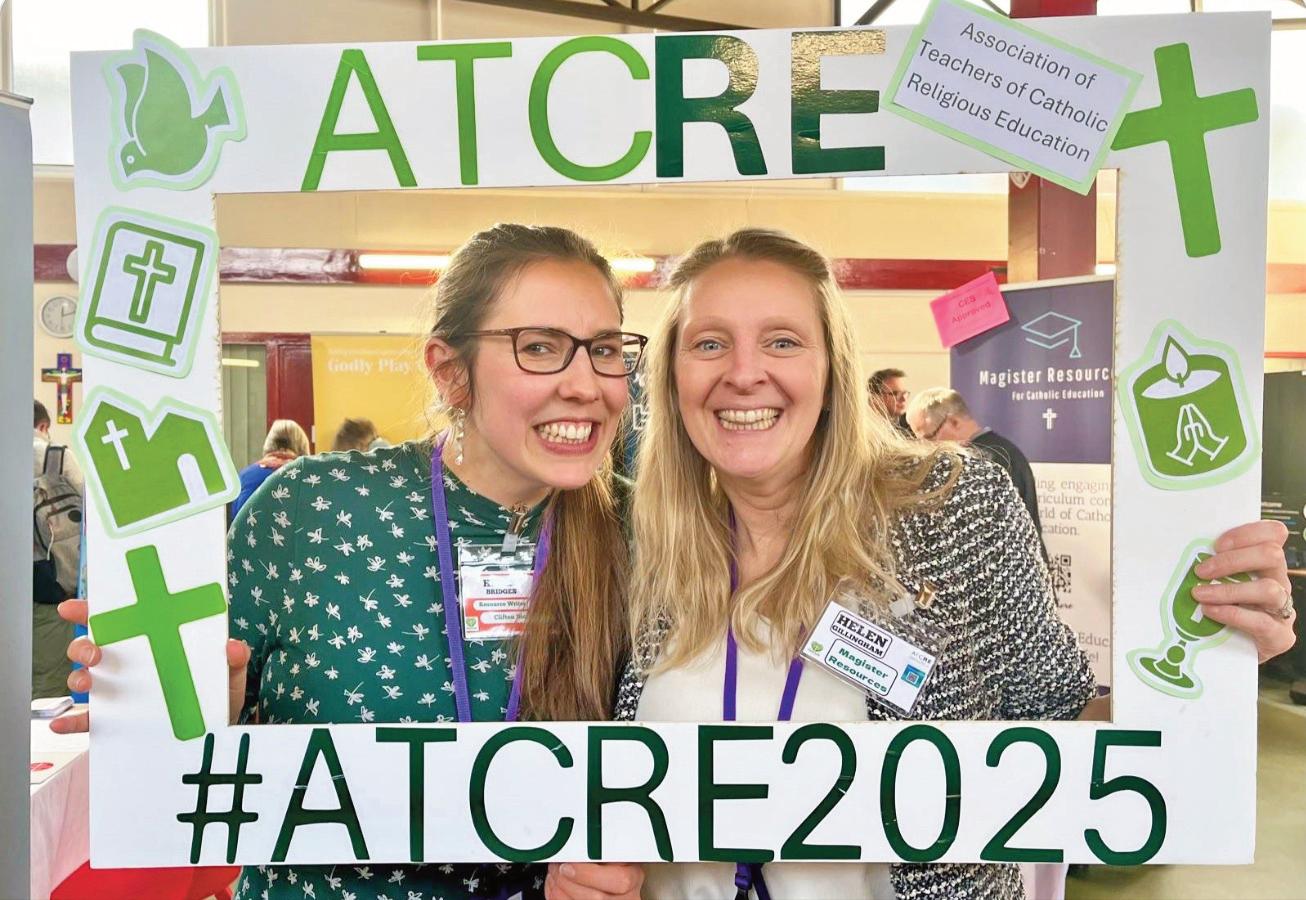
organiser for the conference said, "Scripture at the Heart was our theme… but Saturday saw the heart of the Catholic RE community come together, celebrate and share all that is beautiful,valuable and rich in our vocation."
One attendee shared, "It reignited my passion for RE and reminded me what drew me to the subject in the first place. Lots to think about, thank you!" Another attendee highlighted the event's practical impact,
stating, "The balance between inspiration and practical applications has given me great confidence in implementing what I have taken away into my teaching."
The event was supported by a wide range of organisations, charities and businesses who support Catholic RE and education, for which ATCRE is incredibly grateful. The headline sponsors were Ten Ten Resources and The Bible Society. ATCRE is also grateful to Mr Chris Martin, Principal of St Thomas Aquinas Catholic School, and all his staff, who warmly welcomed us into their school.
Vatican Media
Cardinal Koovakad's Ramadan message promotes unity and peace between Christians and Muslims
In its message for Ramadan, the Dicastery for Interreligious Dialogue highlights that the Islamic holy month this year coincides with Lent - and calls for "inner transformation", so that Christians and Muslims might work together for peace.
This year's message, signed by the Dicastery's new prefect, Cardinal George Jacob Koovakad, is centered on the theme: "Christians and Muslims: What We Hope to Become Together."
“This time of fasting, prayer and sharing," the message reads, "is a privileged opportunity to draw closer to God and be renewed in the fundamental values of religion, compassion and solidarity. This year, Ramadan largely
coincides with Lent, which for Christians is a period of fasting, supplication and conversion to Christ."
This rare alignment in the religious calendar, Cardinal Koovakad writes, "offer a unique opportunity to walk side-by-side, Christians and Muslims, in a common process of purification, prayer and charity."
"More than simply a month of fasting, Ramadan appears to us Catholics as a school of inner transformation," the message continues. In Christian tradition, Lent is a similar time, a period when "through fasting, prayer and almsgiving we seek to purify our hearts and refocus on the One who guides and directs our lives".
Both Ramadan and Lent, through their calls to devotion and self-discipline, serve as reminders that faith "is not just about outward gestures but a journey of inner conversion," the message emphasises.
However, Cardinal Koovakad warns that "in a world marked by injustice, conflict, and
uncertainty about the future, our shared calling cannot be reduced to spiritual practices alone." He stresses that Christians and Muslims "can bear witness together to the hope that friendship is possible, despite the weight of history and the ideologies that divide us."
In this Jubilee Year centered on hope, the message reaffirms the Christian belief that "hope is rooted in the certainty that God's love is stronger than any trials or obstacles."
Faith in God, the statement continues, is "a treasure that unites us." This year, as both Christian and Muslim traditions converge in the observance of Ramadan and Lent, believers "have a unique opportunity to show the world that faith transforms both individuals and societies, acting as a force for unity and reconciliation." The message underscores that Christians do not simply seek to coexist with Muslims but to "live together in sincere and mutual respect."
The common values shared by Christians and Muslims, such as justice, compassion and respect for creation, "should inspire our actions
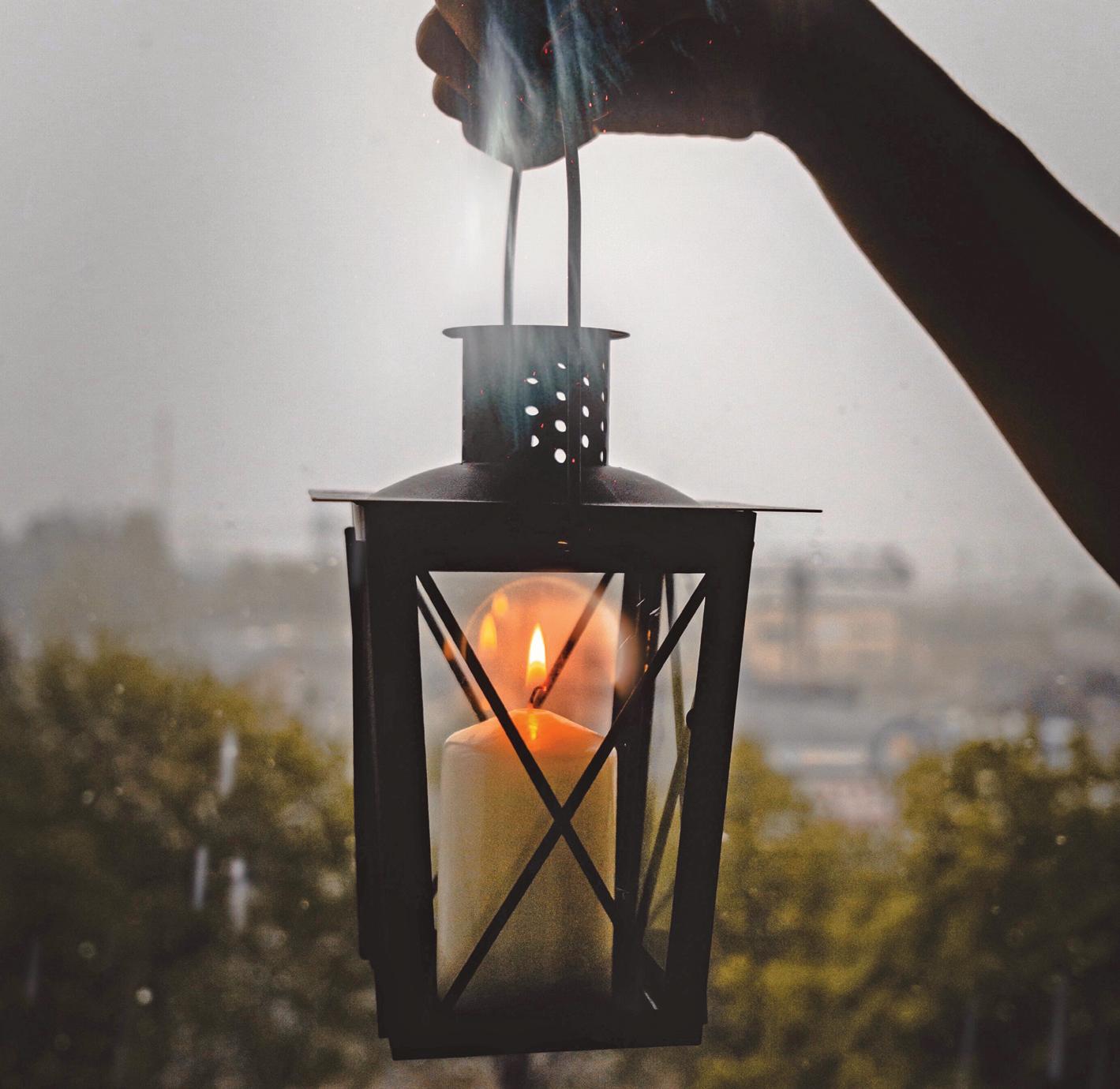
and our relationships, and serve as a compass for building bridges rather than walls", the message goes on to say.
"In this season of Ramadan and the approach of 'Id al-Fitr, we are happy to share this hope with you. May our prayers, our gestures of solidarity and our efforts for peace be tangible signs of our sincere friendship with you. May this feast be an occasion for fraternal encounters between Muslims and Christians, in which we can celebrate together God's goodness."
Touching the Hem ministry offers personal Eucharistic blessings, fostering healing and spiritual connection
Touching the Hem of Jesus' Garment is special devotion to the Blessed Sacrament developed by the Franciscan Friars of the Renewal, to help increase people's experience of the healing power of Jesus in his Eucharistic presence.
This ministry began in the Friars' work among young people and has gradually spread through the Church.
The name recalls the gospel story when the woman with the issue of blood did not feel worthy to approach Jesus directly but felt that if she could only touch the hem of his garment she would be healed.
As part of this ministry the priest or deacon carrying the monstrance cradles it with the humeral veil and stops for a moment in front of each person and blesses them, giving them a personal encounter with the Eucharistic Lord.
Those who have experienced this ministry can testify to the power of it and the sense of the Lord's presence and the silence and reverence with which people process forward to receive this blessing.
At St George's Cathedral in Southwark, the cathedral discipleship prayer group organise a Healing Mass on the second Tuesday of the month ( September to April). This is usually attended by 50 to 60 people, but last month on 11th February, the feast of Our Lady of Lourdes, numbers doubled and about 120 people attended.
Many had never experienced the Touching the Hem of Jesus' Garment ministry before and were quite overwhelmed by its power. So many people attended that this Tuesday (11th March 7pm-8.30 pm) that the organisers have invited extra priests to hear confession after the Mass for healing. As well as the laying on of hands, Rev Neil Philipson will lead the ministry of Touching the Hem Of Jesus Garment and Fr Joseph Donkor will celebrate the Mass and hear confessions assisted by Fr Christopher Pearson from Precious Blood church in Borough.
Kristina Cooper
What is a novena?
A novena is a traditional Catholic prayer devotion consisting of nine days of prayer, often asking for a specific favour or intention. Rooted in Scripture, the number nine symbolises completeness and the fulfillment of God's promises. Novenas are a way to deepen one’s relationship with God, invoking the intercession of saints or the Holy Spirit. By committing to nine consecutive days of prayer, the faithful seek spiritual growth, healing, or guidance, while trusting in God's timing and will. Novenas can be personal or shared with a community, offering strength and hope.
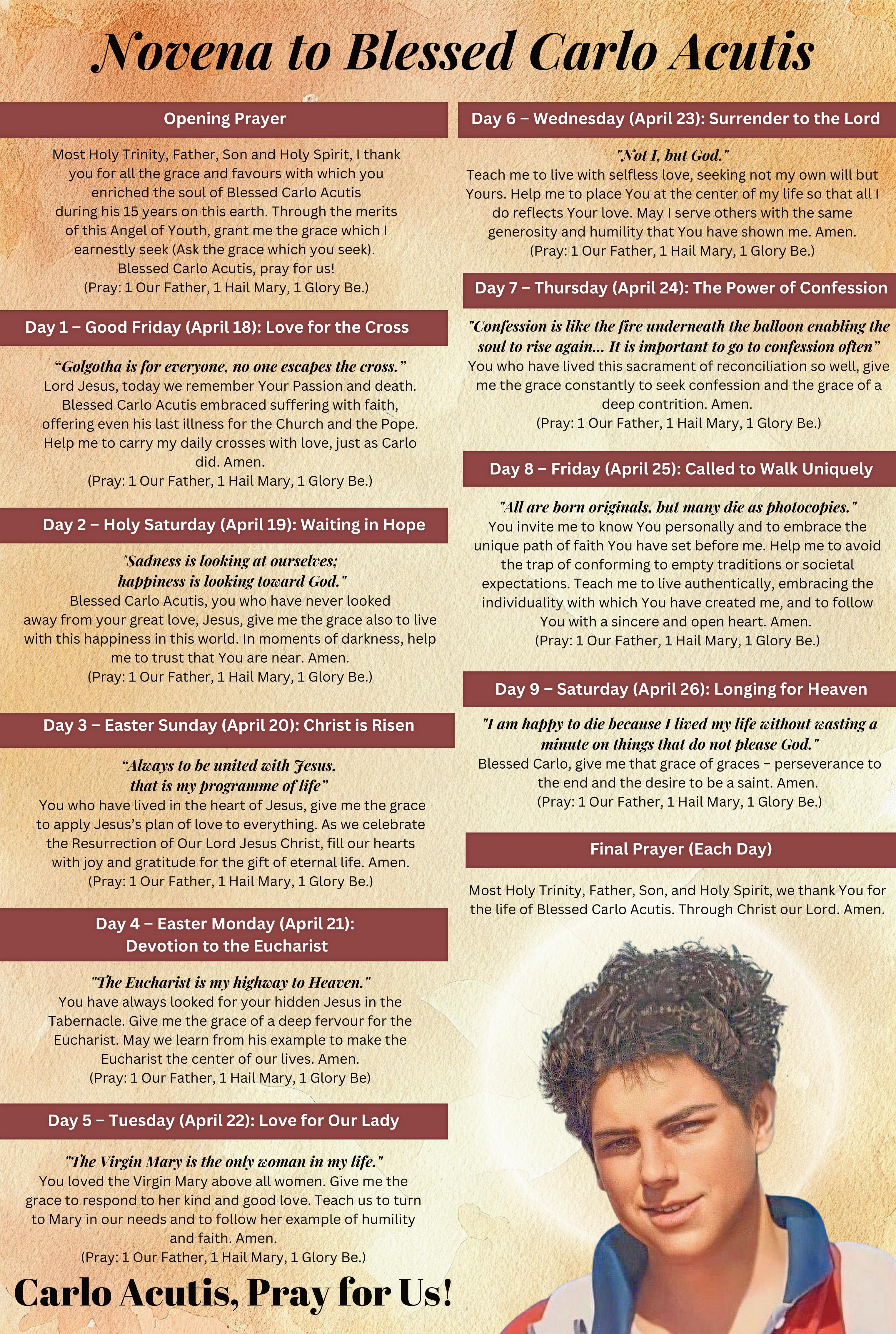


You can use both sets of clues to solve the puzzle: the solutions are the same.
CRYPTIC Across
7 Henry tracks Tolkien's mine to reach Solomon's temple (6)
8 Awful creature! (6)
9 Acre in Alaska's fine, in retrospect, for Hebrew port (4)
10 He came back after nudge, one by a spirited lass (8)
11 This book's dull...also cut (7)
13 Irish saint's oddly evoking good old Exodus (5)
15 She, unfaithful to the prophet, married raver, it's going round (5)
16 Occupation Ulster's withdrawn from, coming to an end (7)
18 Psalm setting, before/after? – a tight one (8)
19 Spring fast with hospital department appeal ending (4)
21 One of Cain's descendants turned bad in Paris, taking 17's heart (6)
22 Unwanted buildup of swabbies, one on top of the other (6)
CRYPTIC Down
1 City that's ultimately shabby, on the other hand is the capital of Kosovo (4)
2 Some versions have this chap meeting Jesus in hero's temple in error (5,3,5)
3 Guy retired after return of writer's block (7)
4 Doctor regularly looks into muscles – they used to read a lot from them (5)
5 Hear old priest's moving 'Hallelujah' (6,3,4)
6 Someone Paul addressed after show, one decked in brown (8)
12 Oxford guy, a leading chap, who's been to Mecca to get David's boy (8)
14 Graduate is, with anger over race, wearing a clerical head covering (7)
17 New report supports pharaoh who killed Josiah (5)
20 Arkwright's circle is embraced by revolutionary dynasty (4)
QUICK Across
7 Mountains where Abraham was told to sacrifice Isaac (6)
8 Deadly; subject to death (6)
9 Variation in spelling of Acre in the OT (4)
10 Infamous son as described in Jesus' parable (8)
11 One of the Synoptic Gospels (7)
13 St ----- of Glendalough, Co Wicklow, d 618? (5)

3 Meeting of a knightly order (7)
15 Son of Japheth and wife of Hosea bearing the same name [Gen] (5)
16 Occupation of the apostle brothers Andrew and Simon Peter (7)
18 Common designation of Psalm 51, set to music by Allegri and others (8) 19 Post-Shrovetide fast (4)
21 Descendant of Cain: 20's father (6)
22 Fearsome person: kind of sauce (6)
QUICK Down
1 Archbishopric second only to Canterbury in importance in the C of E (4)
2 Popular name of a Pharisee, possibly, who hosted Jesus in Bethany (5,3,5)
4 Pulpits or reading desks in early Christian churches (5) 5 English translation of 'Hallelujah!' (6,3,4)
6 Citizen of an NT Roman province (8)
12 Fourth son of David (8)
14 Cap worn commonly by RC clerics (7)
17 Pharaoh, the slayer of Josiah at Megiddo (5)
20 Captain for 40 days and nights (4)